- EUROPE
- SOUTH AMERICA
- SOUTH & SOUTH-EAST ASIA
- WEST AFRICA
- CENTRAL AMERICA
- EAST & CENTRAL AFRICA
- CHINA
- SOUTHERN AFRICA
- NORTH AMERICA
EUROPE
In 2016, the Dutch Ministry of Foreign Affairs gave its partnership with Solidaridad a fresh boost following the evaluation of the successful Farmer Support Programme. Minister for Foreign Trade and Development, Lilianne Ploumen, signed agreements with Solidaridad allocating a total of €80 million by 2020. The strategic partnership is compliant with the ministry’s “aid for trade” policy. Solidaridad has been a pioneer in reforming economies and development policy in this way for several decades.

SOUTH AMERICA
The Sustainable Trade Platform in Colombia concluded its first phase, proving that commercial competitors can successfully collaborate on common sustainability challenges. An external evaluation assessed this multi-stakeholder platform as neutral, safe and relevant. The platform helped to articulate standards, develop climate change adaptation solutions and support producers in making important value chains more inclusive and sustainable.

SOUTH & SOUTH-EAST ASIA
The Malaysian Palm Oil Board signed an agreement with Solidaridad, the first such agreement with an international development organization to enhance the effective implementation and adoption of the Malaysian Sustainable Palm Oil standard for 100,000 smallholders. Similarly, The Solvent Extractors’ Association of India signed an agreement for the first time with Solidaridad to develop an Indian framework for the sustainable production and trade of oilseeds and vegetable oils.

WEST AFRICA
Developing and integrating innovative solutions to address supply chain challenges continued throughout the year. Solidaridad focused on validating the business case to establish rural service centres for cocoa farmers as well as the business case for cocoa farming as an enterprise using empirical data. New discussions centred on farmer service enterprises as a crucial factor for success if best management practices are to be scaled up at both the farm and mill levels.

CENTRAL AMERICA
Solidaridad Central America leveraged experience and relationships built over the past five years to launch regional platforms that create flows of information and innovation to optimize sector transformation of key commodities. Solidaridad also encouraged sharing successful solutions among sectors, boosting capital flows, and accelerating and increasing the impact of sustainable and inclusive practices, including youth participation and gender equity.

EAST AND CENTRAL AFRICA
From Ethiopia to Zambia, and Kenya to the Congo, the rising temperatures and drought conditions, as well as political issues, posed significant risks to agriculture. A general decrease in quantities, qualities and prices of agricultural commodities was evident. Coffee, tea, fruits and vegetable farmers in the wetter highlands continued to adopt climate resistant varieties with Solidaridad’s support. Solidaridad also continued to strengthen partnerships with research institutes in addressing climate-smart agriculture.

China entered a new era of setting sustainable development at the forefront of the political and economic agendas. Through innovative approaches to address China’s environmental footprint both domestically and abroad, Solidaridad worked directly in the sectors of manufacturing, agriculture and international commodity trade to bring continual improvement of environmental and social performances balanced with economic growth.

SOUTHERN AFRICA
Climate change had devastating effects on the region with Southern Africa experiencing its second rain-scarce season, leaving over 29 million people food insecure. With the majority of these populations living in rural areas and reliant on natural resources, addressing climate change through the inclusion of smallholder farmers and promotion of sustainable agriculture practices is at the forefront of Solidaridad’s mission.

NORTH AMERICA
Small but effective – that is Solidaridad North America in a nutshell. With a lean team, Solidaridad is punching above its weight in terms of proposals developed and relationships managed. In 2016, Solidaridad developed proposals in collaboration with all regional centres in the Network, strengthened its connections across North America and managed relationships with both current and prospective supporters and partners.

Foreword by Nico Roozen
Looking back at the past year, a number of key events and themes seem to stand out and define it. The launch of our new strategy Ambition 2020 in March was a pivotal moment for the organization. We strengthened the Solidaridad brand, developed new proposals that received significant support from our funding partners and further improved our cooperation with stakeholders in the regions where we work.
In fact, Solidaridad endured and thrived in a period of great political upheavals in our focus countries. Perhaps the most prominent geopolitical development of 2016 was the US presidential election. The change in government will shape the direction of America’s international development efforts. Our experts in North America expect that the coming years will be challenging and that increased support for environmental, social and economic sustainability organizations will have to come from philanthropic and corporate sources, with less coming from the US government.

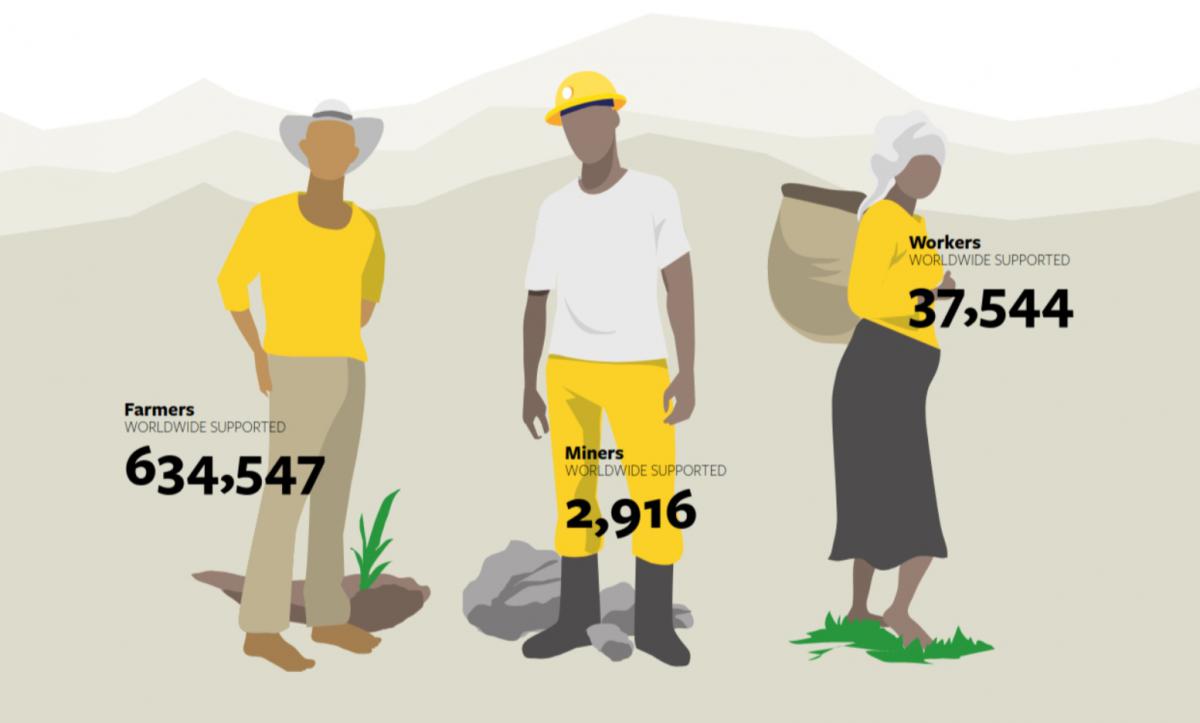
In addition, majority support for a “Brexit” is most certainly a challenge for the European Union as well. The only right answer will be making European cooperation as successful as possible and inviting the British people to join us again in the next decade to correct this historic mistake.
Contrary to fake news spread by extreme right movements, several regions continue to face a growing disaster. Climate change is being felt by producers everywhere. Severe droughts, for example, have impacted our programmes in Southern Africa and Brazil. In South Asia and China, however, we are noticing an increased interest from governments and businesses in finding local solutions to address climate change for their specific communities.
From an organizational perspective, our greatest assets are our partners and our experts, and their support continues to grow year on year. We are strengthened by our partnerships with other organizations, be it corporations or cooperatives, which share our values and aims, and can contribute their experience and expertise. We will continue to work together to enhance our collective capacities by learning from each other.
Across the Solidaridad Network, we are continually striving to improve our accountability and transparency mechanisms. Not only is it of the utmost importance for our donors and partners, as well as our staff and experts, but it is also one of the best ways to influence policy and promote effective sustainability solutions.
Solidaridad’s agenda moving forward will reinforce the new organizational structure based on an innovative strategy that integrates sustainability programmes at international, national and community levels. We know there is still a long way to go – but I am happy to say that we achieved progress in 2016 on many key priorities in our mission to improve the lives of producers while protecting people, planet and profits.
Nico Roozen
Solidaridad Network Executive Director
Vision and Mission
Change that Matters
In everything we do, we are driven by our vision and mission. We seek partnerships with others, collaborate with industries and aspire to be a financially sustainable organization. We will always ensure that what we do contributes to our vision of a sustainable and inclusive economy that maximizes the benefit for all.
Solidaridad is an international network organization with partners all over the world. There is a single agenda and a single strategy: together we learn and progress, together we achieve results, and together we decide on future steps.
Solidaridad is an organization for international cooperation that draws inspiration from the vision, values and capacities of people all over the world.
Solidaridad is a transition manager, focusing on producer support and sustainable supply chain and market development. We partner with those who want to make a difference by changing business practices from being a part of the problem to being a part of the solution. Markets have to work for the poor, and companies are the key change makers.
From a shared vision to change that matters.
Our aim is to make an impact by being the best in building partnerships, in piloting and scaling up programmes, in learning and innovation.
Without a dream there is no first step. At the beginning there are no paved roads; simply by starting to walk, a path is created. Knowledge and values are needed. Skilled and motivated people are our capital. We are realists with a mission. We turn shared vision into meaningful impact in communities.
Solidaridad envisions a world where the people who produce the resources on which we all depend can contribute to change that matters, change that leads to prosperity for all, without harming each other or the environment. This therefore helps to ensure that resources will continue to sustain us for generations to come.
Today, the global economy is not organized in a sustainable way. Many of us now realize that an unsustainable way of life threatens food security, our planet and our businesses. With a world population projected to grow to 9 billion people by 2050, we can only be fed if the agricultural sector makes a transition to smart and sustainable land use. And, as fossil fuel use becomes increasingly problematic, a transition to a bio-based economy is needed. Farmers worldwide therefore have a bright future as providers of food and suppliers of renewable energy and raw materials. They link as never before the issues of food security for developing countries and prosperity for the world as a whole.
Many of us now realize that an unsustainable way of life threatens our food security, our planet and our businesses.
There is one agenda, one challenge: We have to produce more with less, and ensure that it is done in a way that sustains people and the environment. Optimizing land use is the first step towards a solution. Increased production must meet growing demand, but with fewer negative consequences for people and the environment. More efficient production must be coupled with less pollution. There must be greater precision in the use of fertilizers and pesticides, and a reduction in the use of water and energy. Waste then becomes a thing of the past. Losses in the supply chain are reduced. Forests are no longer cut down and additional land is no longer needed because existing agricultural land is being used more efficiently.
There is a single agenda and a single challenge: we must produce more with less and ensure that it’s done in a way that sustains people and the environment.
An inclusive economy – one in which people can participate fully – is needed. It should start with the recognition of the potential of smallholder farmers and women, who are often the leading drivers of sustainable change. It must respect workers’ rights, provide a safe and healthy workplace, and support a living income for farmers and workers.
For children, school is the best place to work. Mining and industry need to switch to a responsible means of production. Workers’ rights are respected and the environment is preserved for future generations, keeping its potential intact.
The change we seek is a market process driven by the private sector. However, civil society organizations and governments play an essential role in enabling and encouraging change. In this process, Solidaridad is a transition manager. We back farmers who are economically poor but have rich potential, entrepreneurial men and women, and workers who want to build their livelihoods on a fair income. Solidaridad partners with all parties in the supply chain, so that everyone can be involved in creating change that matters.
AMBITION 2020: BECOMING A DATA-DRIVEN CSO
Solidaridad launched Ambition 2020, its new five-year strategy, at a network-wide meeting in Ghana in March 2016. This event included 140 senior staff and was the starting point for an exciting journey to transform Solidaridad into a data-driven organization looking for new partnerships to bring speed and scale to the programming. We aim to create a broader dynamic in markets and society that fosters a more inclusive, climate-resilient and sustainable development of economies.

The International Supervisory Board and government leaders launch Solidaridad’s new five-year strategy.
The main challenge for achieving this goal is turning Solidaridad into a data-driven organization. Becoming data-driven will have two aspects: an internal and an external component.
From an internal perspective, all programmes have to provide fact-based evidence of the results and impact of the investments made. Simply promoting good practices is not enough anymore. Fact and figures are important for proving and improving. For showing results and learning from experience. That’s why Solidaridad is developing a data-based and data-driven operating system for monitoring programmes which meets the highest standards and uses the most modern technology.
In Solidaridad’s new programming, two important questions have to be answered:
- How are programmes continued after our interventions?
- How can we scale up our impact?
The real success of a programme can only be measured by its capacity to deliver a solid proof of concept for implementing innovations more efficiently and at a larger scale. Other relevant actors will only join in once they see the proof in the pudding.
From an external perspective, Solidaridad’s new strategy means offering our partners – farmers, miners, workers – access to solutions for their challenges via digital technology. Advances in digital technology now provide rural communities with an unprecedented opportunity to overcome isolation, improve communication, bridge knowledge gaps and adapt practices to create a better living. The digital applications used for technology-driven sustainability programmes will run on neutral platforms to which anyone can connect, rather than proprietary platforms for a selected few.
Being at the forefront of these developments offers Solidaridad the opportunity to become a truly innovative knowledge organization providing scalable solutions in a speedy manner for sustainable production worldwide.
TASK FORCES TEAM UP TO SPEARHEAD NEW STRATEGY
Solidaridad launched its new multi-annual strategic plan, Ambition 2020. With this new strategy, Solidaridad positioned itself as a 21st-century civil society organization with a solution and market-oriented focus. Four task forces were initiated to carry the new strategy into the future. A summary of their activities is presented below.
CLIMATE CHANGE
Solidaridad made the decision to form a Climate Change Task Force consisting of experts from its worldwide network. The task force gave a presentation at the Ambition 2020 event. Two climate funds have already been engaged, one of which could lead to a small contract for scoping climate-smart dairy in Ethiopia. In 2017, terms of reference and official team members will be determined.
GENDER EQUITY
The Solidaridad Network structurally integrated gender mainstreaming with the creation of a Gender Task Force. Members were drawn from the regional offices and a core gender team composed of different staff members with different expertise was set up to ensure gender capacity is anchored in the organization. This allows for valuable and diverse contributions to inclusivity at different levels of the organization. These teams all support and feed into each other and create an enabling environment for strategy development, implementation, monitoring, evaluation and learning.
IMPACT INVESTMENT
The new Impact Investment Task Force convened for the first time during Solidaridad’s Ambition 2020 event in Ghana. Representatives from the Solidaridad Network joined together to develop a strategy. The task force developed a business case tool for cocoa and oil palm farmers. In addition, Solidaridad partner Henkel provided some investment to develop a service provider for the palm oil sector.
LANDSCAPE MANAGEMENT
The Landscape Management Task Force was established during the Ambition 2020 event in Ghana. It includes representatives from each region of the Solidaridad Network. Along with developing new performance indicators and setting fundraising objectives, the task force further defined its strategy for moving forward.
A discussion was started on Solidaridad’s various approaches, whether it be an environmental (WWF), supply chain engagement (IDH) or community (Oxfam) focus. What became clear is that Solidaridad has a specific bridge-building function in the landscapes in which it works, and the new task force hopes to enhance that strength in the years to come.
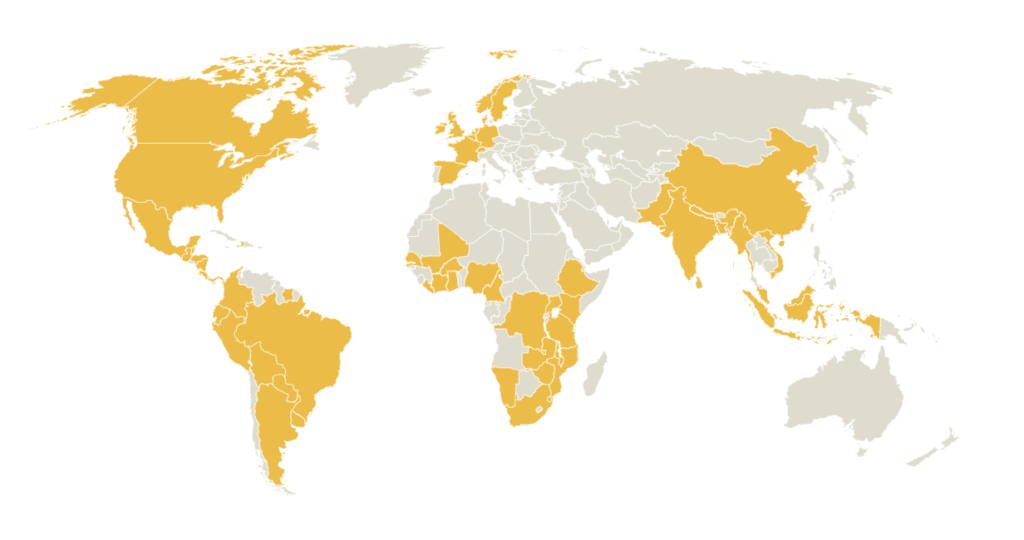
COMMODITY PROGRAMS
Solidaridad works to create sustainable supply chains from the producers to consumers. Among other initiatives, we manage global programmes for 13 of the world’s most important commodities to create sustainable livelihoods for farmers, miners and workers.
FULFILLING AQUACULTURE’S PROMISE
With fisheries in decline worldwide, aquaculture production will need to more than double by mid-century in order to meet growing seafood demand. Solidaridad was hopeful that the cultivation of finfish, which have a low feed conversion rate, will go a long way in fulfilling aquaculture’s promise to produce affordable, high-quality proteins with a small environmental footprint.
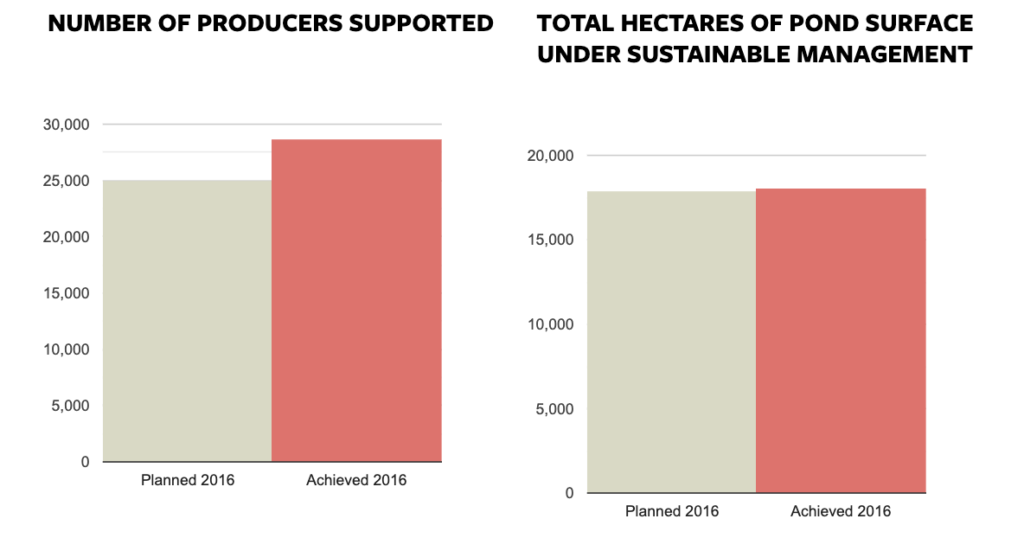
ACHIEVEMENTS
In Bangladesh, Solidaridad supported more than 28,000 fish and shrimp farmers, producing a total of 9,500 tonnes of fish and shrimp. Productivity increases varied between 20-40%, with pangasius farmers scoring the highest gains. Solidaridad’s success in reducing post-harvest losses for transport and marketing costs in 2015 (by 70-89% and 48% respectively) will be integrated into two village supermarkets presently under construction.
Solidaridad’s focus on gender equity is also delivering. While 48% of producer group members are women, 39% of Solidaridad’s producer groups are now led by women. Solidaridad believes that continued investment in the skills and education of women will enable them to spend more of their income on nutrition, education, clothing and health. This will not only improve their livelihoods but also those of their families and communities since they are far better in redistributing the results from their work.
Postlarvae are the most important input for shrimp farmers. Its poor quality continues to undermine their potential. The shrimp service centre, with support from Solidaridad, has managed to give 1,000 farmers access to high-quality shrimp to stock their ponds.
Solidaridad managed to convene 20 EU buyers and 36 Bangladesh suppliers around an agenda to address persistent non-conformities in shrimp supply chains. A face-to-face meeting with this group will be held in 2017.
REGIONAL COMMODITY PROGRAMMES
SOUTH & SOUTH-EAST ASIA
Solidaridad secured a second round of funding in Bangladesh for Solidaridad’s sustainable agriculture and food security programme. In addition to the current participation of 1,000 producer groups, which will continue to receive support, another 500 groups will gain access to the programme, expanding the reach of the programme to 100,000 households. A key improvement will be an enhanced focus on spatial planning to reduce conflict in the crowded delta.

EUROPE
Seafood Trade Intelligence Portal, Fresh Studio and Solidaridad organized the Aquaculture Innovation Challenge in Vietnam, connecting innovative solutions for aquaculture development to sources of knowledge, finance and capital worldwide. Solidaridad Europe also led in-depth discussions with numerous private-sector companies about the business case for black tiger shrimps.

DEVELOPMENTS
Solidaridad, Wageningen University and Deltares applied for a research grant from the Dutch government which would serve to support knowledge about ways in which coastal aquaculture can turn the tide of the combined threat of rising sea levels, reduction in the size of coastal areas and destruction of mangrove forests.
In the second half of this century, the sea level could rise to three meters above current levels. With 75% of the world population projected to live in coastal areas by 2050, there is an urgent need to reconcile human impacts with human needs – most notably protection against rising sea levels and increasingly unpredictable weather events. In developing countries, nature-based solutions are the only hope for cash-strapped governments and communities.
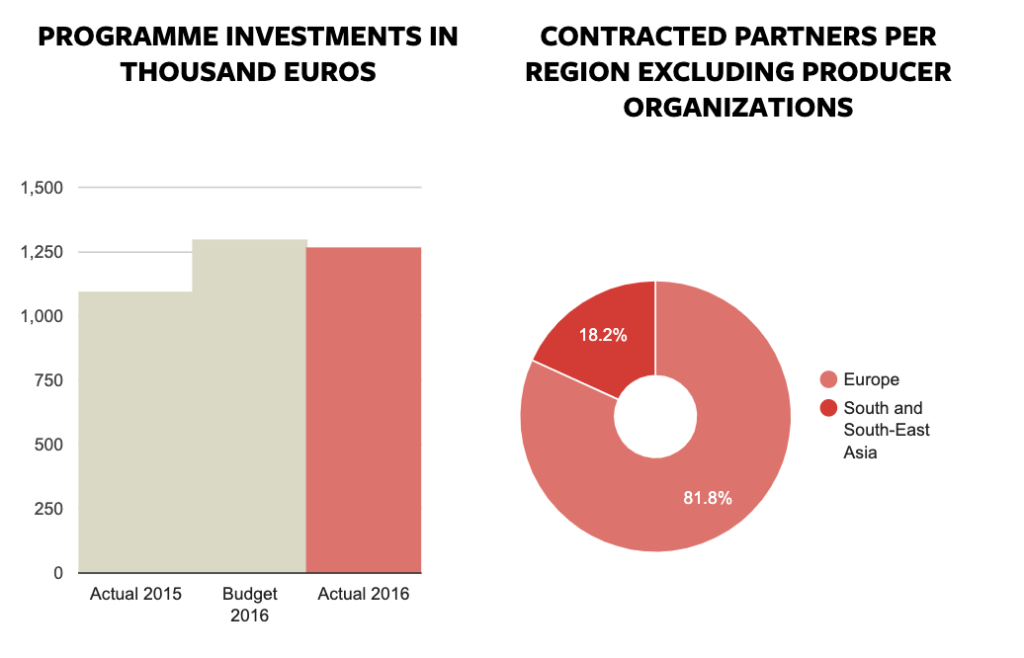
PARTNERSHIPS
In 2016, the aquaculture team initiated several discussions with new partners, including Seafood Watch, the Asian Seafood Improvement Collaborative and a number of private sector companies in retail and trade. The goal is to develop a business case for extensive black tiger shrimp in the European market, reuniting high sustainability standards and cost-effectiveness while offering opportunities for smallholders and ecosystem restoration in vulnerable coastal areas.

CHALLENGES
With an estimated 50-60% of shrimp farms occupying cleared mangroves, shrimp farming has had a terrible impact on biodiversity, left vast swaths of coastland vulnerable to extreme weather and rising sea levels, and catapulted shrimp’s carbon footprint to potentially 10 times that of beef. But maximizing productivity on existing shrimp farms is not a solution if it further erodes the ecosystem services upon which coastal resilience depends.
Moreover, intensive shrimp farming creates massive consequences in the supply chain, most notably due to its dependence on trash fisheries for feed. Countries like Bangladesh, Vietnam, Myanmar and Indonesia have the potential to build resilient coastal communities by combining intensive shrimp cultivation with ecosystem restoration.
In addition, hatchery technology is instrumental for improving productivity, reducing disease and alleviating pressure on wild populations of shrimp and crabs, yet uptake among smallholder farmers is difficult. A combined investment in technology services delivery, business case development and credit access can give a strong boost to uptake.
Spatial planning, zoning and the design of low-impact production systems will need to ensure that aquaculture stays within the ecosystem’s carrying capacity and contributes to the delivery of ecosystem services. For example, mollusks and carps can improve water quality, while mangroves are indispensable in ensuring the resilience of coastal areas.
On the market side, fish consumption will need to shift towards low-trophic species such as tilapia, catfish, carp, and mollusks.
SECURING THE FUTURE: WOMEN, YOUTH AND CLIMATE-SMART COCOA
Solidaridad focused on supporting innovations that placed women and youth at the heart of business development. Programmes included giving tailor-made entrepreneurship and life-skills training, modeling viable business opportunities to prove profitability and making the case for impact investment. Activities were aimed at supporting the development of a thriving professionalized cocoa sector for the future. Solidaridad took concrete steps to support climate-smart cocoa production through the development and testing of low carbon balance tools.
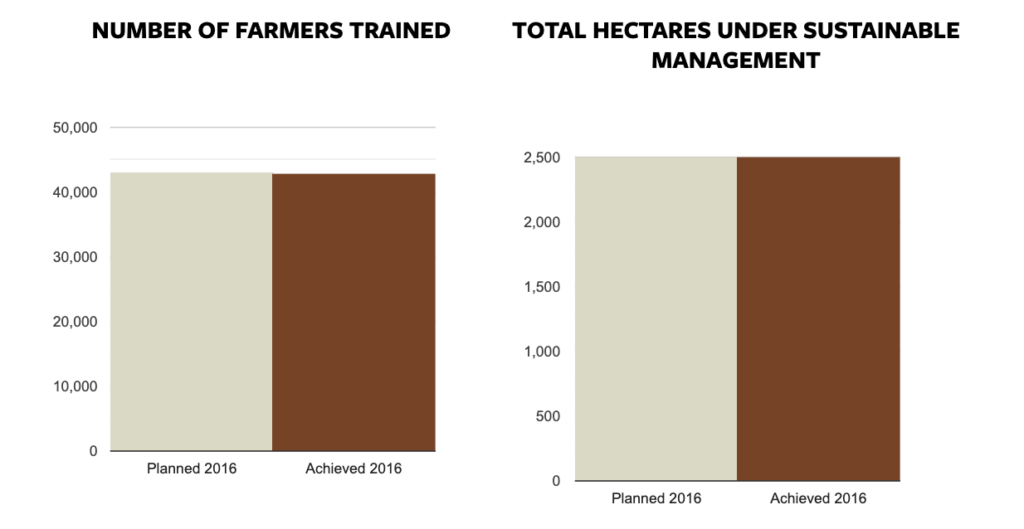
ACHIEVEMENTS
The main goals of the global coffee programme were to:
- Pursue environmental governance, a climate-smart agenda and the integration of ICT tools to provide innovative solutions to producers and supply chain actors
- Create employment opportunities for youth in cocoa production
- Ensure intensification for long-term sustainability in the cocoa sector
- Engage national and local actors on policy and regulatory frameworks for enhancing standards that support adoption of sustainability interventions in cocoa landscapes
Solidaridad developed and tested an integrated greenhouse gas tool to measure the carbon footprint of smallholder production systems and the scenarios for the adoption of low-carbon agricultural practices, zero deforestation and “business as usual” practices. The aim was to provide cutting edge solutions for climate-smart landscapes.
The Rural Horizon self-assessment tool was also deployed for cocoa farmers to demonstrate the effectiveness of a continual improvement programme and technical assistance plan.
As part of the renewed focus on thriving communities, Solidaridad supported the establishment of 19 community governance structures and 19 community actions plans for 200 cocoa growing communities in Cote d’Ivoire. Some 2,500 young men and women have been trained on entrepreneurship development and life-skills to become either professional farmers or service providers within the value chain.
In the area of policy engagement, Solidaridad partnered with UNDP to lead the development of the Ghana On-Farm Tree Ownership Registration Protocol, which has been approved by the Forestry Commission.
Two international conferences were held in the Dominican Republic and Cote d’Ivoire for Women in Cocoa and Chocolate (WINCC). WINCC is slowly becoming a formidable platform for women in the cocoa sector and a channel for women advocacy.
Solidaridad has been innovative and inclusive in promoting the continual improvement of smallholders in the cocoa sector. Its results contributed significantly to achieving low carbon agriculture, empowering women and youth in entrepreneurship and securing sustainable landscapes. As part of efforts to support enabling policy environments, proof of concepts have become invaluable tools for negotiation within the policy arena.
REGIONAL COMMODITY PROGRAMMES
Solidaridad focused on addressing the challenge of low investment in production at the landscape level as well as women’s involvement in agroecology. It led efforts to replace oil palm with cocoa-centric agroforestry systems to improve soil conservation and carbon enhancement. Solidaridad also conducted a baseline assessment of cocoa smallholders to develop smallholder-inclusive and diverse production models within the landscape that focus on improved productivity, income, climate resilience and market access.

The network for Women in Cocoa & Chocolate (WINCC) was launched during the World Cocoa Conference in May 2016. WINCC facilitates collaboration for women to be more visible, easier to connect with each other and to be found. The network hopes to inspire women to increase their sphere of influence and take the lead. WINCC should contribute to quality and the long-term effectiveness of interventions at field level by leveraging the power of women along the value chain.

The cocoa programme focused on climate-smart agriculture and promoted the use of ICT to monitor and provide social, environmental and management performance information to farmers. A carbon balance tool was developed for diversified production systems which include cocoa, forest and livestock to monitor the carbon footprint of farmers. A continual improvement methodology for farmers using the Rural Horizon self-assessment tool is being integrated into the programme.

Solidaridad implemented programmes in cocoa farm enterprises that provided education on agronomy and agribusiness management skills and developing youth networks. Solidaridad focused on enhancing thriving communities where cocoa farmers are being supported in a holistic approach to rural economic and social capital. Initiatives in the region also led to the full operationalization and validation of 20 rural service centres as model service delivery mechanisms for cocoa.

DEVELOPMENTS
Cocoa productivity, access to labour and youth interest in cocoa remained priorities due to their absolute necessity for preserving the sustainability of the value chain. There is also an increasing focus on holistic approaches for thriving communities and not for just the cocoa farmers alone.
Pricing, securing increased farmer incomes, transparency and accountability are all issues that are currently on the table for discussion within the sector. Climate-smart agriculture has also taken centre stage with stakeholders.
These trends were foreseen and Solidaridad took bold steps to address them by focusing on:
- Supporting youth participation in cocoa
- Building internal capacity to implement community-driven programmes
- Undertaking studies
- Contributing to global discourse through panel discussions and the Afrobarometer
Based on the publication of the Cocoa Barometer 2015, the Ministry of Economic Affairs commissioned research on the relation between market concentration and farmer income. Conclusions were shared with a wider public and Solidaridad programmes cited for contributing to change on the ground.
Solidaridad proactively engaged governments and relevant institutions to develop an enabling environment for cocoa production. It focused on developing innovative programmes to support climate change adaptation and mitigation.
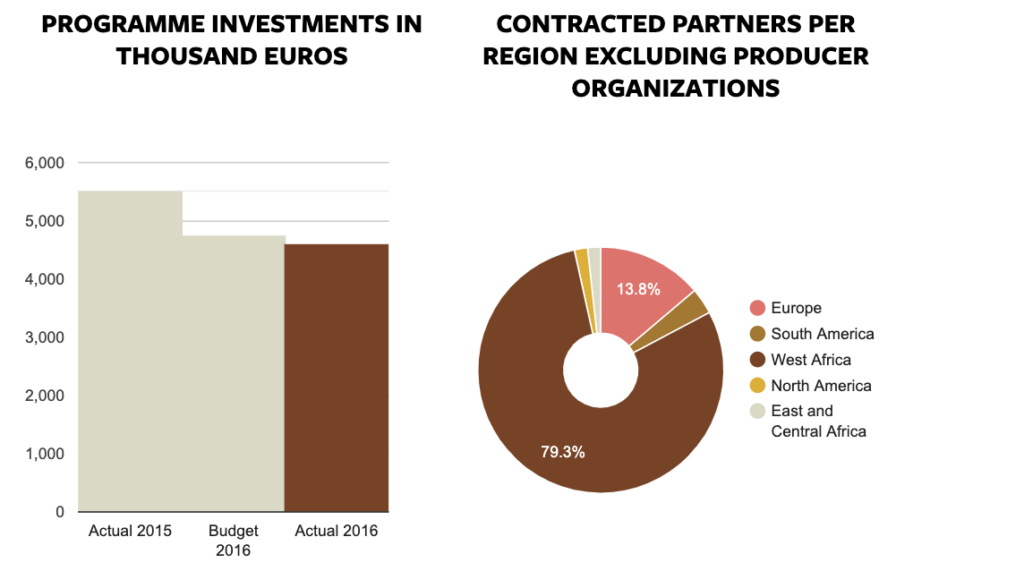
PARTNERSHIPS
The Dutch and Swiss governments, IDH and the MasterCard Foundation continued to be key investors in Solidaridad cocoa programmes for West Africa. Other private cocoa companies including Olam, Ecom, Cargill, Twin Trading, Wienco, EMFED, and Touton, as well as various national regulatory bodies, also continued to partner with Solidaridad.
In Nicaragua, the German chocolate company Ritter Sport and Solidaridad signed an MoU to implement actions in the Region Autonoma del Caribe Sur (RACS) focusing on improved production and postharvest practices for quality cocoa beans.
Solidaridad also signed an MoU with FHIA (Honduran Agriculture Research Foundation) to promote and build capacity on cacao-centric agroforestry systems for smallholder producers in the context of Solidaridad’s Paisajes Sostentible – PaSos (Sustainable Landscapes) initiative in the Northern Litoral Zone of Honduras.
Solidaridad West Africa signed a new partnership with VOTO Mobile Technologies Limited, who will make the Rural Horizon tool easy for producers and NGOs to share information and gather feedback through interactive SMS or voice calls in local languages. Solidaridad also engaged the governor’s climate and forest task force to obtain accreditation in Nigeria. In Cote d’Ivoire, Solidaridad has a new partnership with Mondelez to implement the Jacobs Foundation TRECC project under the Mondelez Cocoa Life programme.
In South America, new partnerships include the Cocoa Industry Association and Cargill. Solidaridad’s partnership with Cargill is bringing greater opportunity for generating co-responsibility from the private sector for responsible cocoa production and expansion.

CHALLENGES
Inconsistency in government policy is a major challenge in sustainable cocoa production, particularly for the free distribution of inputs such as seedlings, agrochemicals and fertilizers. This generated lethargy among the community as far as adequate service provision from the private sector is concerned.
Slow progress from national cocoa platforms impeded coordinated investment and capacity building efforts. Counterfeiting of inputs (pesticides, insecticides and fungicides), complex land tenure arrangements, as well as traditional inheritance practices are issues that adversely affect the professionalization of cocoa farming as a business.
Producers still remain wary of investing in cocoa production given prior negative experiences with crop disease, market crashes, and higher market value for other competing crops such as oil palm and livestock.
In addressing the above challenges, Solidaridad engaged governments and relevant stakeholders to reassess current government policies while working with landowners, traditional leaders and other partners (FC, UNDP, CLS) to improve the security of land and tree tenure.
Some success has been achieved. A documentation protocol was developed especially for land and tree tenure. The process of building a landscape and commodity programme is extremely useful. It shows avenues for making more efficient investments, considering that cross-cutting themes such as climate and robust infrastructure are needed for any commodity production.
INCREASING INVESTMENTS FOR SCALING UP BEST PRACTICES
The first phase of Solidaridad’s climate-smart agriculture programme in Mexico, Colombia and Peru concluded with promising results. Solidaridad has now developed a proof of concept that combines higher and more consistent productivity and quality with improved environmental management.
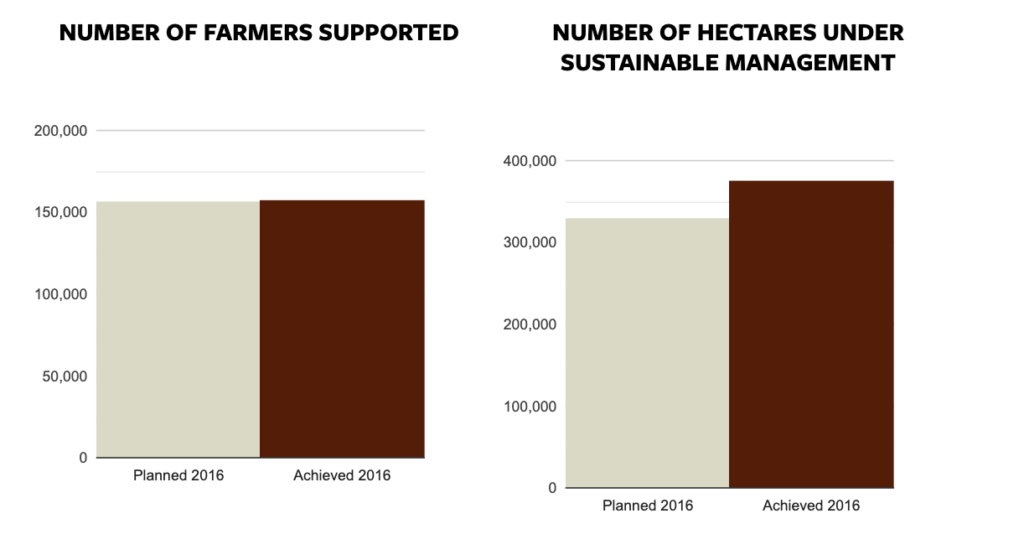
ACHIEVEMENTS
Comprehensive analyses conducted together with Trueprice indicated a positive return on investment for climate-smart agriculture (CSA) projects. Replicating Solidaridad’s proof of concepts across Latin America and East Africa will be combined with more innovative blended finance models to increase the speed of uptake by the sector.
Solidaridad began the development of a self-assessment tool for coffee farmers to measure performance related to good agricultural practices called Rural Horizons. This digital tool enables extension field officers to give direct and better recommendations to farmers improve field training programmes, monitor the adoption of practices and gain a better understanding of the financial needs to improve the performance of farms.
In Peru, Solidaridad developed an innovative tool called BASIST to support extensionists in monitoring crop performance. In East Africa, the management information system has been implemented at the level of farmer cooperatives to facilitate the administration of producer data on production, sales, practices and training.
Solidaridad took on a pro-active role in the facilitation of non-competitive collaboration in the coffee sector at the national and international levels. At the national level, the Sustainable Trade Platform in Colombia fostered the co-creation of new tools and studies on key issues such as soil management, generational renewal and working conditions for farm workers. Solidaridad and regional partners laid out the conditions for replicating this mechanism in Mexico, Honduras and Kenya.
At the international level, Solidaridad provided key support for the development of the Sustainable Coffee Challenge and the Global Coffee Platform.
REGIONAL COMMODITY PROGRAMMES
In 2016, Solidaridad concluded the Bringing Agriculture, Carbon and Knowledge (BACK) to REDD+ coffee programme in Chiapas, Mexico. This effort resulted in the development of a validated technological package that accelerates coffee rehabilitation and renovation. It achieves this by introducing leaf rust resistant varieties with proven cup quality for market access, and intensifying and diversifying production systems. This, in turn, leads to increased income, food security, farmer efficiency and resilience.

In June, Solidaridad presented the results of its global climate-smart agriculture agenda in Dublin during the World of Coffee Event, organized by the Specialty Coffee Association of Europe. Engaging with the European coffee sector is part of a broader strategy to involve more companies in supporting smallholders to adapt their coffee production model to prevent the increasingly negative effects of climate change.

Two flagship projects of Solidaridad´s coffee programme finalized their first phase in 2016: the BACK to REDD+ project in Peru and Colombia and the Sustainable Trade Platform in Colombia. The BACK to REDD+ project proved the feasibility of producing more coffee with a lower environmental footprint. The use of the Cool Farm Tool to measure GHG emissions of production systems moved coffee producers closer to selling carbon credits via Gold Standard verification.

In June, Solidaridad presented the results of its global climate-smart agriculture agenda in Dublin during the World of Coffee Event, organized by the Specialty Coffee Association of Europe. Engaging with the European coffee sector is part of a broader strategy to involve more companies in supporting smallholders to adapt their coffee production model to prevent the increasingly negative effects of climate change.

DEVELOPMENTS
Global coffee consumption continues to grow at an average pace of 1.3% over the past three years to a total demand in the calendar year 2015/2016 of 151.3 million bags. The minor supply deficit (3.3 million bags) is a result of insufficient production growth rates to keep pace with the annual consumption growth. The widening deficit can primarily be linked to climate events in the main Asian countries of Vietnam and Indonesia.
Central America seems to have overcome the low production caused by the rust outbreak in the past years. Colombia kept its strong growth rhythm and led in sustainability performance. Brazil had a positive harvest year despite climate issues in the major growth area.
Growth rates of certified coffee production at the global level are slowing down. The commitments of major roasters on sustainability have shifted gradually to company-specific procurement policies.
Annually, less than €175 million is invested in sustainability projects, which represents only 1% of total green coffee value. An estimated $4.1 billion is required to cover all sustainability needs in the sector. This calls for urgent actions to develop alternative models to ensure the scaling of investment in sustainability practices at the farm level.
Current investments are insufficient to keep pace with the growing negative impact of climate change, food insecurity, rural-urban migration and the lack of perspectives for the new generation of coffee farmers.
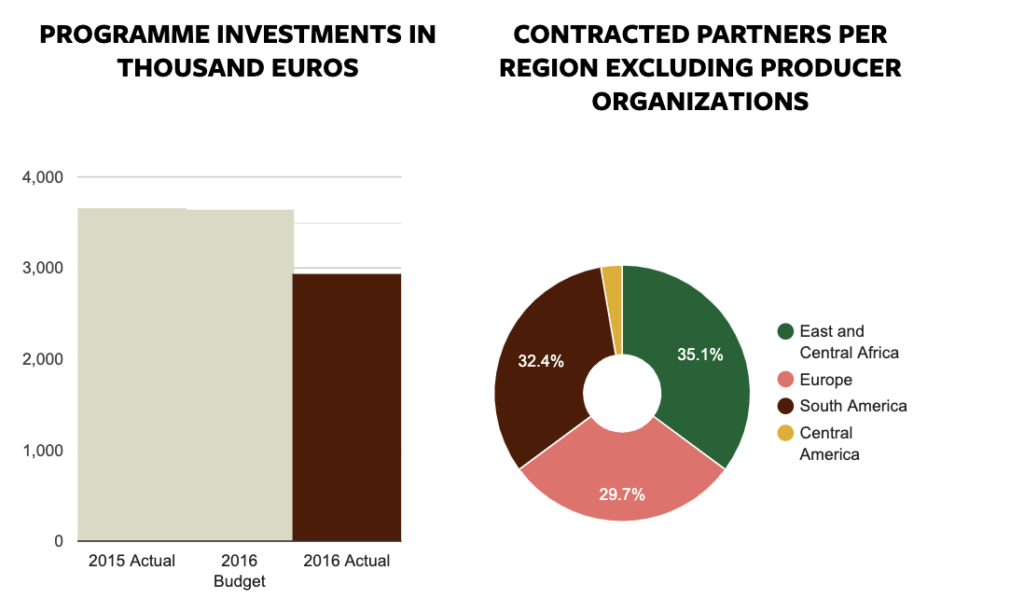
PARTNERSHIPS
Solidaridad became an active board member of the Sustainable Coffee Challenge (SCC). This group represents a fast-growing movement of stakeholders in the coffee sector that aims to increase investments to encourage sourcing of sustainable coffee.
Solidaridad is also a strong supporter of the work of Global Coffee Platform (GCP) in pushing for a collective agenda on sustainability in the global coffee sector. Collaboration and coordination between the SCC and GCP are crucial for an effective uptake by the sector in the coming years.
Within its coffee programme, Solidaridad values its collaboration with key companies such as Starbucks, Louis Dreyfus, Volcafé, donors such as NORAD, the Dutch Ministry of Foreign Affairs, Irish Aid, knowledge institutes such as CENICAFE, and producer organizations such as FNC, JNC and the Ethiopian Coffee Unions.
In collaboration with UTZ, Global Coffee Platform and the Sustainable Commodity Assistance Network, a thorough sector analysis in Mexico, Honduras and Nicaragua elaborated on the needs and opportunities for non-competitive collaboration between public and private partners in the field of good practices, robust infrastructure and enabling sector policies.

CHALLENGES
Growth rates of certified sustainable coffee production and sales continue to slow down in mature markets such as the EU and the US. The introduction of company-specific standard programmes by bigger roasters has made it more difficult to measure the collective sustainability performance of the sector.
The development of a sustainability framework by the SCC and GCP is a crucial step for improving the transparency on sustainability efforts. Cost-efficient, transparent and accessible information systems are required to support decision-making by stakeholders in the coming years.
The focus on compliance with sustainability practices supported the sector in improving the conditions for farmers, workers and their communities. However, recent analyses indicate a wide range of external conditions is still not considered in the production costs. The vast share of these social and environmental realities are currently absorbed by farmers and workers.
Better identification of the conditions at farm level will help the sector to improve the social and environmental return on sustainability investments. The inclusion of a true price calculation can bring down hidden costs and increase the benefits for farmers.
Extension services play a crucial role in supporting farmers to improve their practices and output. However, the elevated costs of technical assistance and the limited coverage of their services puts challenges on these services in the long run. The use of (mobile) tools and training can increase the scale and effectiveness of technical support to smallholders to scale up the implementation of good agricultural practices.
SUSTAINABLE COTTON GAINING MOMENTUM
Solidaridad contributed to a sustainable cotton sector from field to fashion. By supporting Indian farmers in adopting good agricultural practices, exploring innovations together with supply chain partners in Mozambique and by monitoring company performance via the Cotton Ranking, Solidaridad worked on enhancing both the supply of and demand for sustainable cotton. The increasing interest in cotton sustainability, visible in national policies and through corporate commitments, is an encouraging incentive to amplify sustainability efforts in 2017.
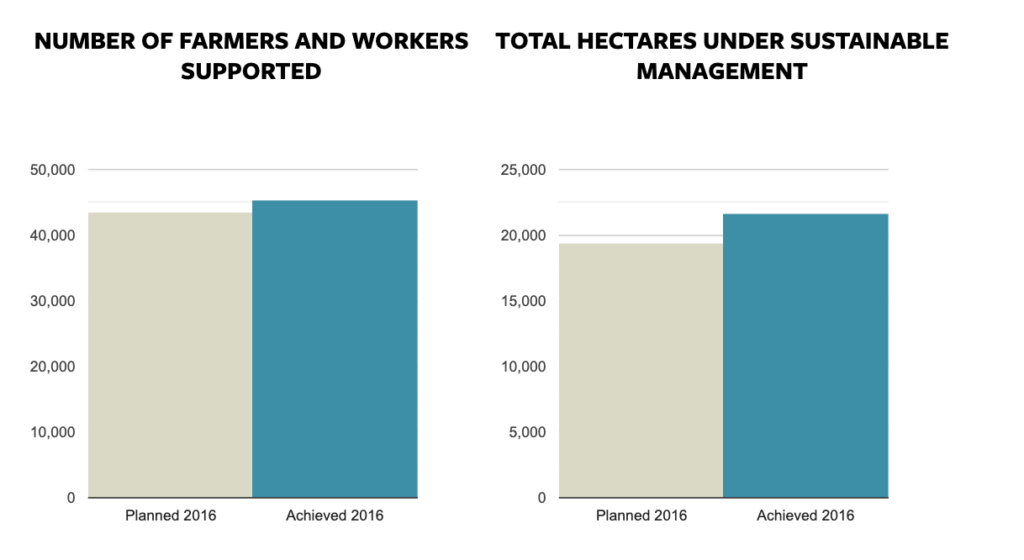
ACHIEVEMENTS
Solidaridad contributed to improvements in the cotton sector via interventions at various levels.
At the farm level, Solidaridad pioneered the introduction of the Better Cotton Initiative (BCI) with smallholder farmers in South Africa. Solidaridad’s programme in Mozambique evolved from implementing best practices for testing innovative ideas in a cluster set-up. In India, Solidaridad was able to connect with the Central Institute for Cotton Research and partnered with the Universidade de Viçosa in Brazil with the vision of transferring scientific knowledge to the farmers.
In East and West Africa, Solidaridad influenced the cotton sector on a national level. Solidaridad introduced sustainability via a newly established cotton and textile platform in Ethiopia. It continued supporting smallholder cotton producers and completed the Scoping study on sustainability issues: analysis of the Ethiopian cotton sector. In Ghana, Solidaridad signed a Memorandum of Understanding (MoU) with the Cotton Development Authority (CDA). The purpose of the MoU is to provide a framework for Solidaridad and CDA to work together in revitalizing the cotton industry in Ghana.
At the end of the supply chain, the publication of Solidaridad’s report Mind the Gap and the Cotton Ranking, on the divergence between the supply of more sustainable cotton and the demand or actual uptake by companies, has been instrumental for Solidaridad in engaging with a broad group of companies. The topic of uptake of sustainable cotton and the role of companies in driving demand is now central to ongoing discussions in the cotton sector.
REGIONAL COMMODITY PROGRAMMES
- EAST & CENTRAL AFRICA
- EUROPE
- NORTH AMERICA
- SOUTH & SOUTH-EAST ASIA
- SOUTHERN AFRICA
- CHINA
- SOUTH AMERICA
- WEST AFRICA
After a recent increase in textile production in Ethiopia, the local demand for lint cotton rose significantly. These developments in the country have changed the dynamics and trends of production and consumption, from lint exporter to exporter of finished products. The government of Ethiopia is developing a 15-year National Cotton Development Strategy. Solidaridad played, and will continue playing, a significant role in the roadmap and strategy development.

The publication of Solidaridad’s report Mind the Gap and the Cotton Ranking, on the divergence between the supply of more sustainable cotton and the demand or actual uptake by companies, has been instrumental for Solidaridad in engaging with a broad group of companies. The topic of uptake of sustainable cotton and the role of companies in driving demand is now central to ongoing discussions in the cotton sector.

Solidaridad North America continued supporting Solidaridad China in implementing the cotton project funded by the Walmart Foundation. Initiated in 2014 in the Hebei province, the project builds upon Better Cotton Initiative (BCI) training programmes to address the needs of women cotton farmers. Due to challenging conditions in the country’s cotton sector, the project adapted to also train the women in business development skills, enabling them to seek alternative livelihoods.

Despite untimely rainfall alternating with long periods of dry weather that have taken a heavy toll on the cotton crops in many parts of the country, Solidaridad’s cotton programme in India has been able to support more than 40,000 farmers in adopting good agricultural practices. Furthermore, Solidaridad conducted a knowledge sharing event in March 2016 with the most important stakeholders of the Better Cotton projects. Implementing partners, several scientists from the Central Institute of Cotton Research and the BCI country representative actively participated in the event.

Solidaridad expanded its network in Southern Africa, which helped build a stronger foundation for more collaboration. Together with partner JFS, Solidaridad further developed the project from implementation to innovation. In a cluster set-up, selected smallholder farmers now lease bigger plots of land and work together on sustainable practices such as crop rotation. Proposals for scaling up this concept are currently being developed with other potential partners.

With support from VF Corporation, Solidaridad trained 1,940 farmers (including 921 women) in good agriculture practices. A total of 717 hectares of land is now managed responsibly and 968 tons of BCI verified lint cotton was produced in Hebei province. Solidaridad will gradually hand over the Hebei smallholder farmer project in 2017 to the local partner, Yunde Mianye Gin, who will independently continue the project implementation.

Based on a diagnosis of smallholder cotton production in two traditional cotton regions in Brazil, a successful pilot project was completed with support from the C&A Foundation. Solidaridad developed a model of smallholder cotton production capable of improving the productivity and income of producers, valuing the means of production such as soil, water and inputs. It also integrated systems that are sustainable and resilient to climate change.

Through the Savannah Accelerated Development Authority (SADA), the government of Ghana has signed a Memorandum of Understanding with a Chinese company for the establishment of a textile factory in Ghana. The plan is to connect smallholder cotton farmers in the savanna in the Northern part of Ghana to grow the needed cotton. Solidaridad started a partnership with SADA and the Cotton Development Authority to conduct an initial scoping study on cotton development issues in Ghana.

DEVELOPMENTS
Even though competition with human-made fibres, especially polyester, remains a challenge for the cotton sector as a whole, the main challenge still concerns the way conventional cotton is being produced by smallholder farmers. Soil depletion and overuse of water and pesticides have devastating effects on people and their environment.
Moreover, the effects of climate change have made the transition towards sustainable, climate-smart agriculture indispensable. Supporting smallholder farmers in developing countries in adopting good agricultural practices remains the key focus of Solidaridad’s cotton programme.
Sustainability in cotton is gaining momentum globally and throughout the supply chain. In China, the new national Better Cotton practice was released by the Ministry of Agriculture. South Africa joined the Better Cotton Initiative, and the International Cotton Advisory Committee (ICAC) chose sustainability as the overall theme for its annual conference.
Furthermore, an increasing number of brands committed publicly to sourcing more sustainable cotton. This is a development that Solidaridad will closely monitor via the Cotton Ranking to be published in 2017 for the second time.
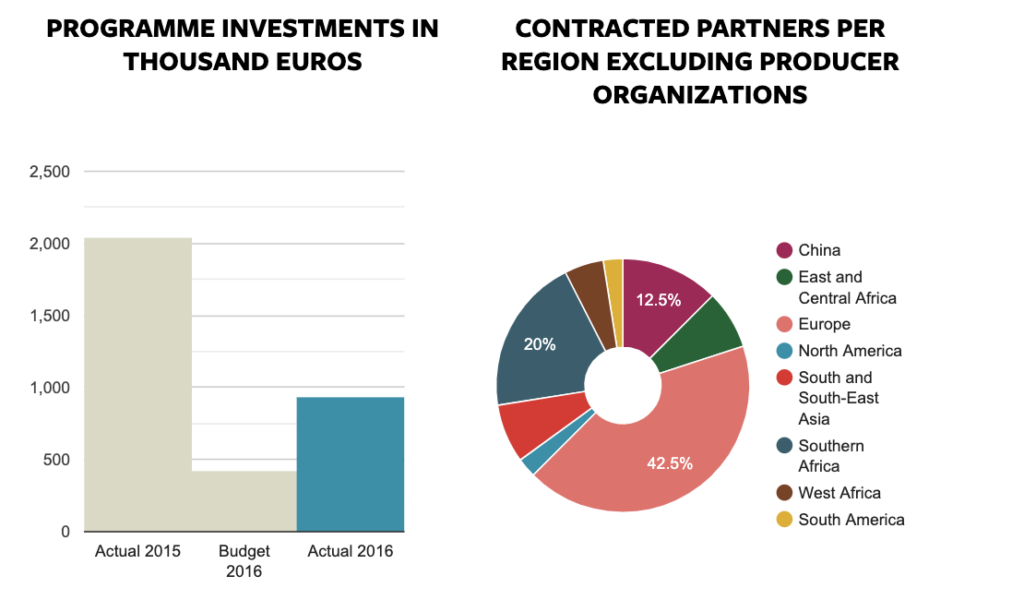
PARTNERSHIPS
In 2016, Solidaridad partnered with a variety of organizations in the cotton supply chain and sector at large, including:
- Cotton producer organizations
- Cotton ginning and trading companies
- Input providers (seed and fertilizer companies)
- Government cotton authorities
- Non-governmental organizations
- Retailers and brands
Solidaridad cooperated with the Social Resource Institute in China to enhance capacity building for women to enable them to benefit from sustainable cotton production. It also sought to improve their abilities in leadership, decision making and marketing. This partnership enables Solidaridad to learn and strengthen its gender-related interventions.
Solidaridad supported ginning company JFS in Mozambique in training farmers on sustainable farming methods and organized an exchange visit to Mozambique with field facilitators and farmers from South Africa. Moreover, the collaboration with JFS enabled Solidaridad to explore innovative solutions in the field, which it intends to scale up in 2017.
At the brand level, Solidaridad renewed its partnership with VF Corporation, Decathlon, Bestseller and IC Group who continued their support for a Better Cotton project implemented by Solidaridad in India and China. The German brand Adler also became a new partner.
Strategic partner H&M supported Solidaridad in conducting a scoping study in Ethiopia and policy dialogue continued with the intent to renew the partnership in 2017.

CHALLENGES
Even though the volume of sustainable cotton produced is higher than ever, the social, ecological and economic issues occurring in cotton production are far from resolved. Of all cotton produced, about 75% is currently grown by smallholder farmers in developing countries. The consequences of climate change, inefficient water use, lack of access to good seeds or equipment, limited market access and price fluctuations make cotton farming a risky and in many cases unattractive business. This puts the future of cotton and its farmers at risk.
In 2016, Solidaridad worked together with partners to support farmers in making cotton farming a sustainable viable business. With input on good agricultural practices from scientific research centres like the Central Institute for Cotton Research in India, and by testing innovative solutions like the setup of clusters together with partner JFS in Mozambique, Solidaridad developed comprehensive programmes that address the lives and livelihoods of cotton farmers and their communities as a whole, both on and off the field.
In Zambia, for example, Solidaridad implemented a programme that focuses on improving cotton production together with enhancing food security among rural farming communities. Solidaridad works with a system that is cotton based but also supports at least three other crops.
In Ethiopia, Solidaridad indicated the need for a connected supply chain that links the farmer to the market. The involvement of all stakeholders in the programming currently being developed creates opportunities to connect supply and demand and develop sustainable supply chains from local to international markets. These efforts all help to address sustainability issues from field to fashion.
INCREASING BUSINESS WITH NEW FARM MODELS
Dairy could be a cash cow for farmers, but often it isn’t. Professionalization is the key to connecting small farmers to the growing formal dairy market. It is also key for making dairy economically viable and sustainable for the climate, land use and animal welfare. In addition to capacity building, milk production needs technology, finance opportunities and trusted relationships with dairy companies. Each situation needs a tailor-made solution, which Solidaridad is trying to achieve.
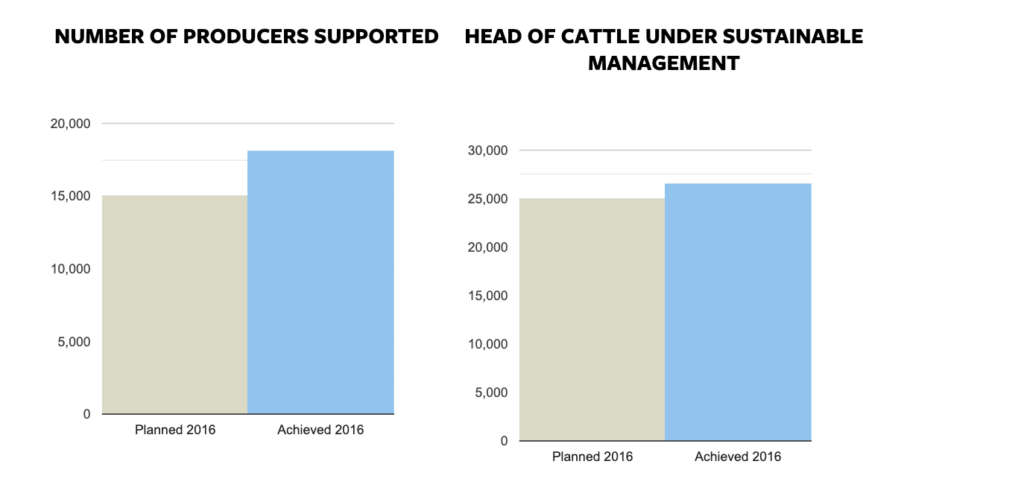
ACHIEVEMENTS
In Bangladesh, Solidaridad achieved significant progress with 17,000 farmers and their families and communities in dairy development using a holistic approach of forming producer groups, capacity building, SME development and linking these farmers with the market. In following phases, Solidaridad will work on further professionalizing business-driven models such as dairy producer companies that manage farming and processing in the villages.
In Myanmar, Solidaridad started the development of a proof of concept for New Dairy Zones with partners (communities, private sector, business partners), producing milk for the growing formal market. In 2017, this is expected to lead to a proof of concept with potential partners in Myanmar and the Netherlands.
Solidaridad developed a clear vision on how to professionalize dairy and make it business driven and sustainable. This vision was shared with the dairy sector at the World Dairy Summit in Rotterdam and at the livestock congress in Myanmar. Participants appreciated the holistic vision for focusing on real professionalization for medium-scale enterprises. Solidaridad intends to support this with capacity building, technology, market development and impact investment.
The Biocarbon Fund of the World Bank invited Solidaridad to elaborate its vision on an investment and climate-smart development approach in Ethiopia. Results of this approach will be presented in 2017.
With colleagues from its regional offices, Solidaridad reviewed opportunities for how to develop the dairy sector with potential partners in India, Zambia, Rwanda, Tanzania and Nicaragua. The expectation is to begin implementing this in 2017 with a partner in Tanzania.
REGIONAL COMMODITY PROGRAMMES
After three years In Bangladesh, the SaFaL programme has been successful in achieving real progress for 17,000 dairy farmers, setting up well-organized dairy farmer groups, partnering with BRAC as a private dairy company, and establishing milk collection centres and other kinds of SMEs. Solidaridad will continue this approach with more focus on developing SMEs, forming dairy producer companies, and organizing community-driven professional dairy farming and processing.

EUROPE
Solidaridad Europe developed a clear vision on how to professionalize dairy in Africa and Asia and make it business driven, climate smart and sustainable. This vision was shared with sector leaders at the World Dairy Summit in Rotterdam. The new vision is guiding development of new programmes within Solidaridad’s global network like in Myanmar, Ethiopia and Tanzania.

DEVELOPMENTS
The formal market in developing countries is growing, but only a limited number of small farmers participate in this market. There is mistrust between dairy companies and small farmers through lack of volume, quality and cooling.
A solution could be to focus on medium-sized farmers to get enough specialization which can lead to more milk production per cow with a higher quality. The volume and quality will increase trust and result in guaranteed uptake with higher prices. A strong market position will support farmers in getting finance to establish a more professional farm that includes technology.
Such developments provide an opportunity for new entrepreneurs to give services like input and livestock services. Additionally, the professionalization will lead to sustainability improvements like reduced emissions, animal welfare and reduced land and water use.
Solidaridad is pushing this through SME development and new production models and is bringing these approaches to impact investors like World Bank and the dairy industry.
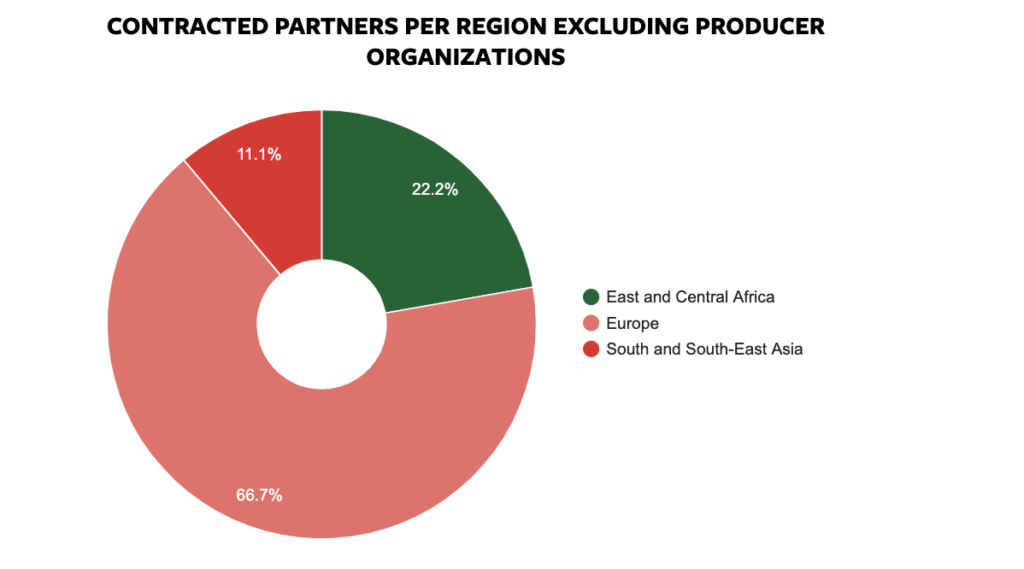
PARTNERSHIPS
Partnerships mainly consist of local leaders, such as the partnership with BRAC in Bangladesh. Solidaridad is also seeking potential partnerships in programmes with global dairy companies like FrieslandCampina and Unilever.
Solidaridad is an advisor of the Dairy Sustainability Framework and conducted an internal study with Wageningen UR about roles and responsibilities of multinationals in developing countries.

CHALLENGES AHEAD
Dairy has been a focus commodity at Solidaridad for three years. Solidariad experts are convinced about the real opportunities for dairy to improve livelihoods and sustainability, but it’s not easy to develop the dairy sector. The sector is capital and technology intensive, requires animals in ranging climates and produces fresh products twice a day.
Learning from past experience and a change in vision on the development of commodities led Solidaridad to focus on medium-sized farmers to make the dairy sector climate smart and economically, socially and environmentally sustainable.
The challenge is to integrate this vision further in projects and pilots in Bangladesh, Myanmar and Ethiopia. But not by Solidaridad alone. The challenge is to share knowledge, inspire and initiate projects together with the dairy sector and other organizations.
BANANA SECTOR ON TRACK FOR TRANSFORMATION
Solidaridad and the World Banana Forum partnered with the Ecuadorian government, national exporters association, banana farmers, workers unions, international banana companies and retailers in order to improve occupational health and safety in banana production. A national manual was developed based on new legislation and endorsed by the Ecuadorian government. This national manual will be a reference document for capacity building in the sector.
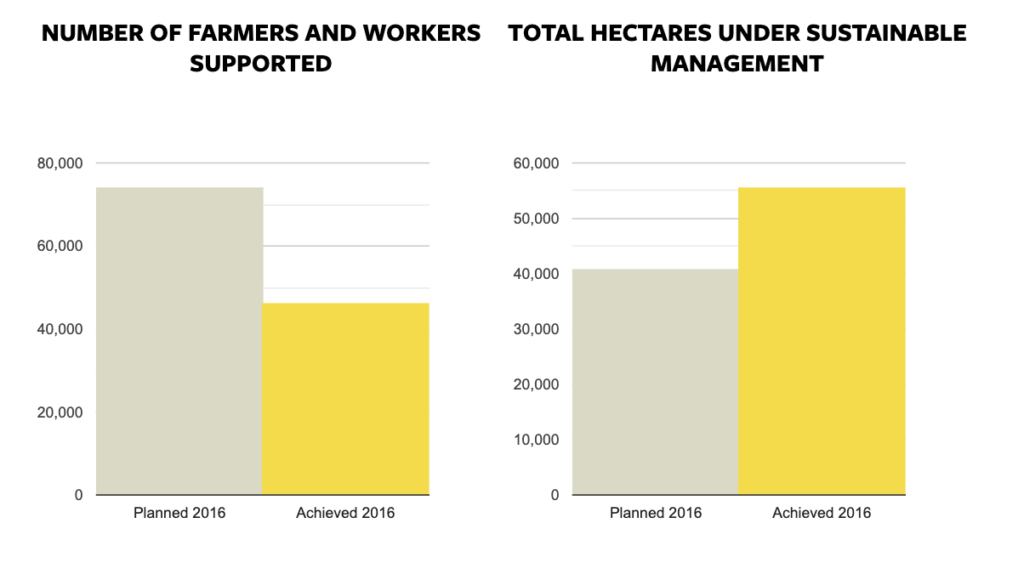
ACHIEVEMENTS
BANANAS
Solidaridad worked on national sector transformation in the banana sectors in Ecuador, Peru, Colombia and Cameroon. Bringing together the relevant stakeholders in the sector and addressing a joint agenda in order to improve the sustainability of the sector is an approach that leads to structural change on a national level in the focus countries. The main issues to be addressed differ from country to country from strengthening performance and organization of smallholders to the integrity of certification, health and safety of banana workers and communities, and mitigation of the impact of climate change on banana production.
FRUIT JUICE
In the fruit juice sector, Solidaridad worked with FrieslandCampina Riedel (FCR), a leader in the Dutch fruit juice market. Together with FCR, Solidaridad engaged with the European Fruit Juice Business Association (AIJN) in order to improve social and environmental practices in orange juice production in Brazil and mango puree production in India. Various AIJN members joined Solidaridad and FCR in order to address the challenges in the sector in a pre-competitive way.
FOOD SECURITY
Solidaridad worked on safe and healthy food for local markets using its experience in international supply chains for domestic supply chain development. The vast majority of fruits and vegetables (F&V) produced in the world is not exported. Consumption in African and Asian countries is growing fast due to both population growth and increased consumption per capita. The growth of the market is mainly coming from growing cities.
REGIONAL COMMODITY PROGRAMMES
In several African countries, food security programmes were implemented to improve production and supply chains for local markets. Food safety is an important aspect in this context to avoid contaminated food from being consumed. International alignment has been sought in order to improve the efficiency so that standards for national markets are accepted in other African markets as well.

Solidaridad Europe is building coalitions in the fruit and vegetable sector to develop and drive the sustainability agenda. Solidaridad is an active member of the World Banana Forum. In the juice sector, Solidaridad is working with Friesland Campina Riedel and a group of companies in the CSR workgroup of the European Fruit Juice Association (AIJN). For the fresh fruit market, Solidaridad signed a covenant with fruit and vegetable companies, convened by IDH, that included commitments for 100% sustainable sourcing in 2020.

The main achievement is the development of sector collaboration in Colombia, Ecuador and Peru in which Solidaridad played a pivotal role. In addition, the self-assessment tool Rural Horizons was adapted for citrus production together with the producers’ cooperative Citri. Sector engagement with brands on the market side and farmers and producers on the supply side led to the development of a plan to support 4,400 farmers who produce 10% of the world’s orange juice.

Together with FrieslandCampina Riedel, a programme was implemented in India in which training was provided to improve labour circumstances in the processing industry. Solidaridad also broadened its partnership with Islam Enterprise and two other exporters to scale contract farming. Together with the three entrepreneurs and with support from the Department of Agricultural Extension (DAE), GoB, SaFaL is mobilizing 200 mango and 500 vegetable producers.

DEVELOPMENTS
Panama disease, or fusarium wilt, TR4 has infested banana plantations in Asia and has been reported in Jordan and Mozambique. This is a concern. Once present, the disease cannot be controlled by common chemicals or current crop management practices. There is fear that the disease will reach the main production areas in Latin America as well.
The World Banana Forum, in which Solidaridad is an active partner, set up a TR4 Task Force that has implemented a sector-wide action plan to tackle and manage the current crisis. Actions include awareness raising campaigns, adoption of early warning systems, training programmes, development of control and management systems and of alternative banana cultivations.
In the fruit juice sector, consumption in Western markets is under pressure. This affects the exporting countries where the volumes are being reduced, leading to low prices for farmers and farmers dropping out or switching to other products. This is especially the case in countries where the fruit is primarily produced for processing.
In other countries, the fruit is primarily produced for the fresh market while the leftovers are sold to the processing industry. Where this is the case, it indicates the fruit juice sector has limited influence over the practices in fruit production.
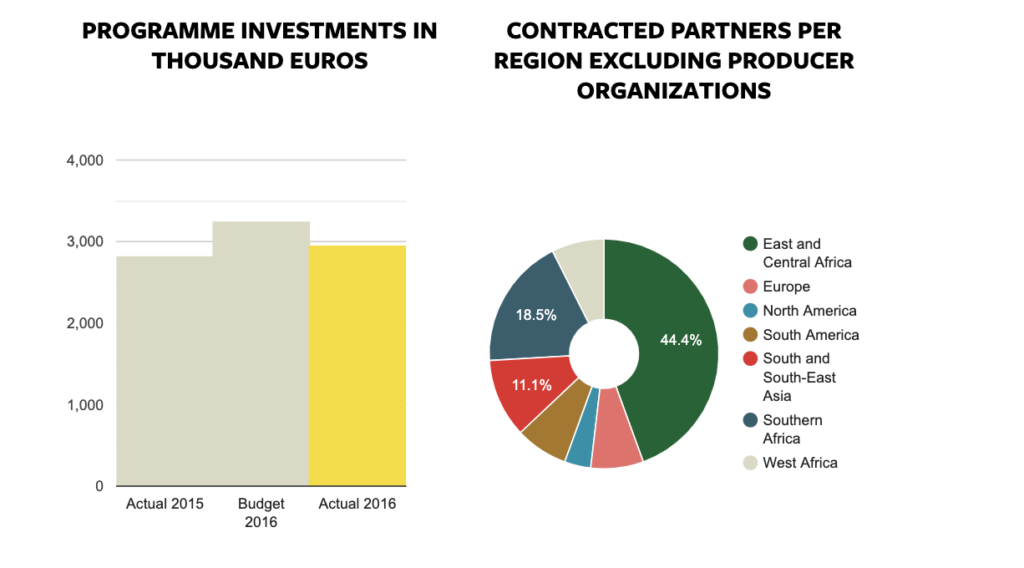
PARTNERSHIPS
In the banana sector, Solidaridad partnered with the World Banana Forum and different members of the forum, notably banana companies and retailers. It also works with IDH, an organization that is facilitating collaboration in the sector and is providing co-funding for projects.
The main issue that Solidaridad seeks to improve in this context is occupational health and safety. This is partly related to the risks of pesticide use in the sector. Solidaridad promotes and supports health and safety committees at the plantation level in order to assess and improve the circumstances.
For the juice sector, Solidaridad’s main business partner is FrieslandCampina Riedel (FCR). In collaboration with FCR, Solidaridad worked with the European fruit juice business association AIJN and also with the Sustainable Agriculture Initiative (SAI platform), an industry platform for leading food companies. SAI developed the Farmer Self Assessment (FSA), which is a set of criteria for farmers.
Solidaridad developed Rural Horizon for citrus, a bottom-up IT tool developed with farmers and for farmers. This tool is made compatible with FSA criteria so that farmers can perform a self-assessment and receive guidance for working on improvements and complying with FSA. SAI members will increasingly accept the FSA criteria.

CHALLENGES
The main challenge for the Solidaridad fruits and vegetables programme was to effectively support the development of production and supply chains for local markets in a way that guarantees a decent living for farmers and workers on the one hand, and provides a stable and resilient supply of healthy and safe food for domestic markets that’s affordable for low-end consumers on the other hand.
This requires sector transformation with the right regulations and incentives, sufficient infrastructure and focussed support and capacity building. The availability of the right technologies, inputs and services are crucial for this sector to further develop. Solidaridad is providing support in these areas in selected countries for selected subsectors.
LEADERSHIP AND COOPERATION RESULT IN GREATER IMPACT
Solidaridad’s global gold programme became a founding member of several new collaborative initiatives, such as the European Partnership for Responsible Minerals, which are expected to have a long-term global impact. At the same time, through new programmes in mining communities, Solidaridad is on track to double the size of its support to small-scale mining communities with a new focus on women’s empowerment. Solidaridad also laid the groundwork for innovative models to scale up successes, in particular through working with social entrepreneurs and impact investors.
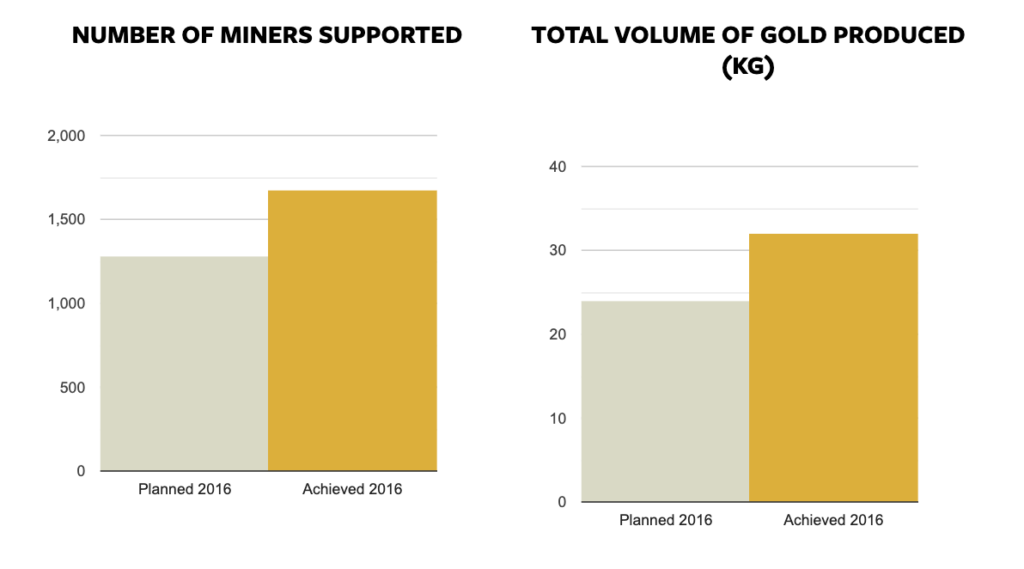
ACHIEVEMENTS
In 2016, Solidaridad’s gold team was proud of their achievements in mining communities as well as highlights at the international level.
Solidaridad accelerated the Going for Gold programme: a five-year programme in collaboration with SIMAVI and Healthy Entrepreneurs to economically and socially empower women in mining communities. Solidaridad identified new mines to include in its Going for Gold programme with the goal of supporting 29 new mines in Tanzania and Ghana to achieve best practices by 2020. This will double the size of Solidaridad’s support for small-scale miners.
Solidaridad produced a 20-minute film about its innovative partnership with industrial mining company Minera Yanaquihua in Peru. The company achieved certification from the Responsible Jewellery Council and also worked with Solidaridad to incorporate small miners from nearby communities into its core business model, rather than moving them off the land. Solidaridad was pleased to hear reports that the film was being used by large mining companies and roundtables to introduce new thinking about development around industrial mines.
Also in Peru, Solidaridad and its CSO partner Red Social capped the four-year Oro Justo (Fair Gold) project funded by the European Union. The project delivered over 300 trainings and reached 5,227 beneficiaries, including men and women in mining communities and local government officials. Two small-scale companies are expected to achieve certification in 2017 as a result, and there is broader interest from mining federations in Peru to work with Solidaridad on policy changes that can speed up formalization and responsible operation in Peru. There have already been indications that Solidaridad’s work is contributing to newly drafted legal frameworks.
REGIONAL COMMODITY PROGRAMMES
The first mine in Africa to reach Fairtrade certification, Syanyonja Artisan Miners’ Alliance (SAMA) in Uganda, was a partner of a Solidaridad partnership with Fairtrade Foundation in East Africa.

In May, the new European Partnership for Responsible Minerals (EPRM) was launched. The EPRM is co-founded by Solidaridad and brings together industry, governments and CSOs with the goals of increasing the volume of responsible produced minerals, supporting local development, and promoting dialogue and learning.

Solidaridad expanded its policy work into Bolivia by establishing policy dialogues with federations of small-scale miners and the government. Current policies in Bolivia prevent the broader uptake of responsible practices, so these dialogues are urgently needed. They will have a special focus on formalization and gender. Solidaridad is also developing the PIM online platform for information exchange about small-scale mining in the Andes region, with the near-term goal of including local legislation for Peru, Colombia, Ecuador and Bolivia.

Solidaridad promoted the adoption of sustainable mining practices by introducing fair mining standards to artisanal small-scale mines. Programmes were designed to improve the livelihoods of small-scale artisanal miners and their communities. Additionally, Solidaridad worked with miners to adopt occupational health and safety standards. Through various partnerships, interventions moved women’s economic empowerment and access to reproductive health services forward. Solidaridad’s enabling policy interventions contributed to national discussions on land management issues in the small-scale mining sector.

DEVELOPMENTS
The demand for certified, traceable gold continued to outstrip the supply. In 2016, certified mines produced approximately 900 kilograms of gold. While this is a modest increase over 2015, this still represents less than 1% of annual gold production. Solidaridad has pledged that by 2020, at least 5 tonnes of gold per year will be generated through its global gold programme. For this to happen, Solidaridad will need to focus on new, innovative models to scale up its work over the coming years.
A development that is expected to contribute to this uptake is the European Union nearing agreement on a regulation that would require European gold buyers to trace and report on the origin of their gold. The anticipated law is expected to take effect in the coming years and will likely increase the demand for traceable, responsible gold.
It will be important for European gold buyers to participate in initiatives, such as EPRM and the Dutch gold dialogue, that support small miners to sell their responsibly-produced gold to the market. Otherwise, it may be challenging to meet these new legal requirements.
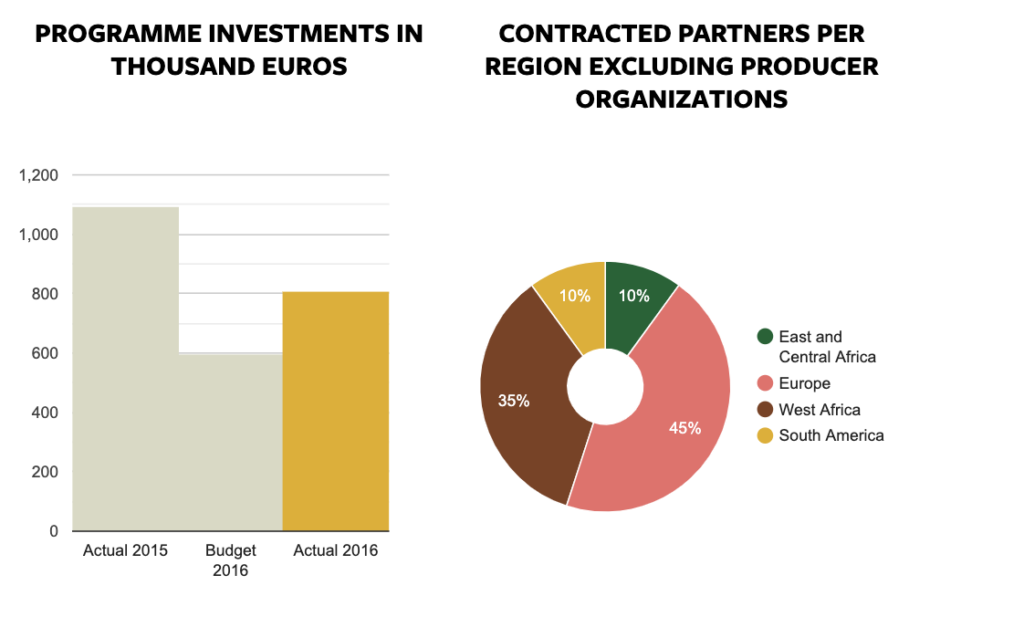
PARTNERSHIPS
In May 2016, Solidaridad co-founded the new European Partnership for Responsible Minerals (EPRM). The EPRM brings together industry, governments and CSOs with the goals of increasing the volume of responsible produced minerals, supporting local development, and promoting dialogue and learning. The partnership is a necessary additional measure to the upcoming EU regulation and can prevent negative consequences that could otherwise result from new legislation, such as companies boycotting certain high-risk regions.
In addition, Solidaridad continued its work with the Dutch government and gold sector to jointly make agreements on responsible business conduct in international value chains. The participants work together to address challenges that companies cannot solve individually. Similar agreements for the textile and banking sector were signed in 2016. Solidaridad hopes to reach an agreement for the gold sector in 2017 that includes concrete targets for joint action.
Solidaridad also completed the year-long inception phase of its new Going for Gold programme, along with partners Simavi and Healthy Entrepreneurs. This five-year project, funded by the Dutch government, aimed to empower women in mining communities in Ghana and Tanzania by working with 29 new small-scale mines to provide better opportunities for women.
Simavi will work in the surrounding communities to improve health and sanitation. Healthy Entrepreneurs will enable women to start their own businesses selling high-quality, low-cost health products and increasing awareness of proper health practices. This partnership is important because women typically experience the biggest negative impacts from mining while being denied equal access to the benefits.

CHALLENGES
Mines learn good skills through Solidaridad’s training programme but without access to appropriate credit, their ability to continually improve their practices will be slow. Typical financial institutions, even those set up to work with smallholders, view artisanal and small gold mining as especially risky. Solidaridad is working with financial institutions to see opportunity in the small-scale mining sector and to show that the sector is actually no more risky than farming, which brings the uncertainties of weather and pests.
Solidaridad has co-sponsored a dialogue with Dutch financial institutions to explore pathways for greater impact investment in the sector. Impact investors offer credit at favourable rates and seek both a financial return as well as an environmental and social return, making them a good match with Solidaridad’s work.
Another challenge is services that miners need to improve their practices, such as mercury-free processing equipment and advice on good financial management, are not accessible in most small-scale mining communities. CSOs like Solidaridad could continue to offer these services on a grants basis, but that does not lead to a long-lasting, viable services sector.
For this reason, Solidaridad’s global gold programme also laid the groundwork for testing new models of supporting not only good practices at small-scale mines but also a robust services sector run by local entrepreneurs offering products tailored to the needs of small-scale miners. It also includes exporters, who can help link responsible miners with the growing demand for responsible, traceable gold in Europe and around the world.
SUSTAINABILITY INCREASINGLY ON THE AGENDA
As a result of the Paris Climate Agreement, livestock sustainability is gaining more attention worldwide. One of the challenges is to combine climate-smart livestock production with a decent income for the millions that try to earn a living in livestock. Solidaridad’s experience from the eight livestock Farmer Support Programmes in seven countries provided a solid foundation for setting up new initiatives in 2016.
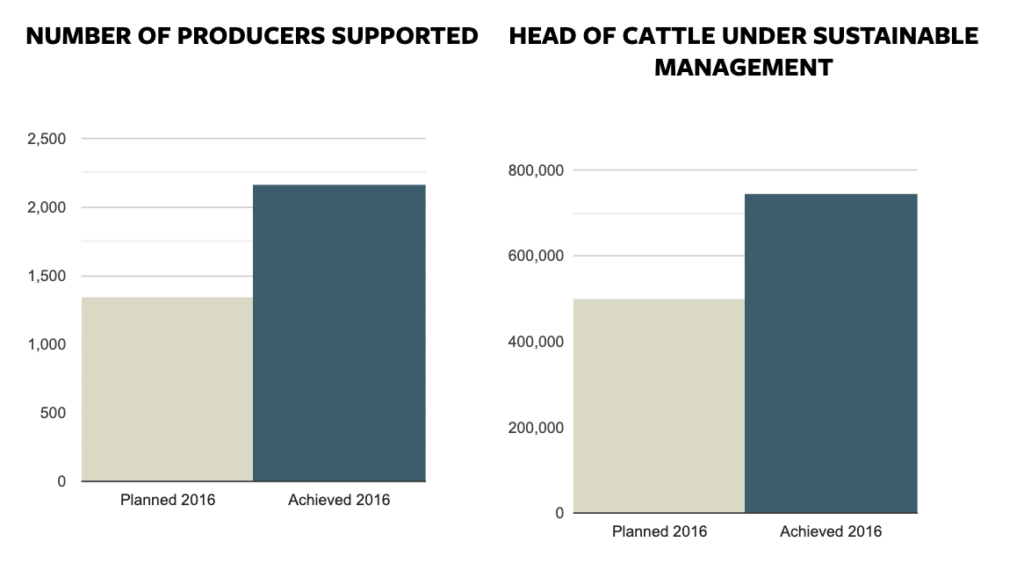
ACHIEVEMENTS
The eight livestock projects under the Farmer Support Programme in Latin America and Africa became great examples of how increased productivity and environmental improvement can go hand in hand. These programmes also provided valuable experiences on reaching sector consensus about sustainability. In Brazil, for instance, Solidaridad has been instrumental in setting up a sector dialogue as part of the national roundtable for sustainable beef (GTPS).
REGIONAL COMMODITY PROGRAMMES
The rapid expansion of palm oil and livestock production systems are driving deforestation and the acceleration of environmental degradation in the eastern part of Nicaragua. Solidaridad is working with the livestock community to promote sustainability and set up a platform for livestock sustainability.

Solidaridad Europe engages companies in the leather sector to clean up their supply chain. An initial collaboration was set up with chemical company Stahl in several leather-producing regions in the world. Stahl is the global market leader in chemicals for the leather sector. New partnerships are now being developed with downstream buyers and manufacturing companies who use leather in the garment and shoe sectors.

In the Amazon, the region with the world’s largest remaining tropical forest, Solidaridad and its partners initiated the “Program for Promoting Low Carbon Smallholder Business” in the State of Para, with a pilot project in the municipality of Novo Repartimento. In Paraguay, Solidaridad and the Rural Association from Paraguay joined together to engage 287 beef farmers in the Chaco areas with in total 743,814 head of cattle over 965,888 hectares.

In the tannery cluster of Kanpur, India, Solidaridad began its first leather project to promote inclusive land and water efficiency, and cleaner production. The tannery cluster produces about 400 tons of liquid and solid waste daily, full of chemicals from the leather making process. Together with the tannery associations, Solidaridad is working on improving the water quality in the Ganga Basin.

In the dry northern part of Namibia, a total of 2,430 traditional livestock farmers were trained in rangeland and livestock management between 2013 and 2016. Selling cattle also improved through a scheme in which farmers were paid up to half of the value of the animals as an upfront loan to finance overhead costs. In cooperation with the local NGO Conservation Agriculture of Namibia (CAN), planned grazing was introduced to stimulate rotational grazing as a first and crucial step towards restoring balance in the environment.

DEVELOPMENTS
In the next 10 years, beef consumption is expected to increase by around 20%, most of the increase taking place in emerging countries. Considering that 80% of agricultural land use is related to livestock, pressure on land and water will further increase. That’s why livestock often plays a crucial role in sustainable landscape management.
For landscape projects in a number of countries, including Paraguay, Honduras, Zambia and Tanzania, Solidaridad is setting up platforms that involve stakeholders to help them formulate what is required to optimize livestock’s contribution to sustainable landscape management.
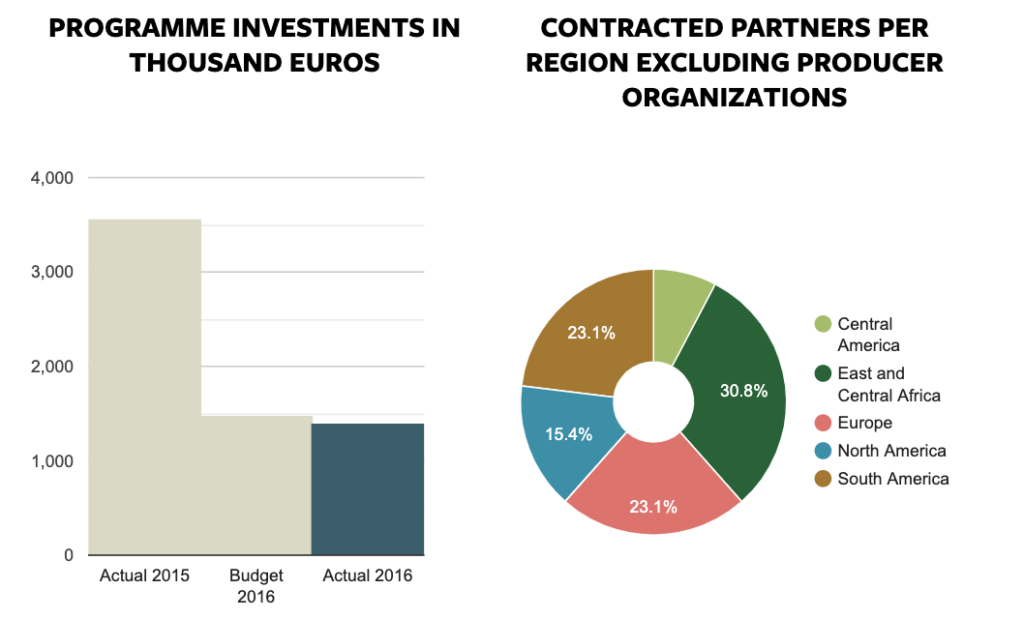
PARTNERSHIPS
The Global Roundtable Sustainable Beef (GRSB) is still the most relevant platform for promoting sustainability in the beef sector. GRSB is focused on North America and Brazil, but expanding its global reach. In Africa and Asia, GRSB aims to develop projects and establish a means by which these can become demonstration projects, following the example of Solidaridad farmer support programmes.
In the leather sector, Solidaridad began working in India with STAHL, a global market leader in chemicals for the leather sector, with the ambition to broaden this cooperation in other locations. Many consumer companies in the leather sector are mapping their supply chain and increasingly looking for possibilities to improve sustainability.
Solidaridad is also increasingly in contact with consumer companies in the leather sector, mainly in fashion and sportswear.

CHALLENGES
The global livestock sector is increasingly under scrutiny since the Paris Climate Agreement as cattle accounts for around 9% of human-induced GHG emissions. The challenge is to reduce these emissions while at the same time ensuring a decent livelihood for the hundreds of millions people dependent on livestock for a living. This requires professionalization of livestock farming.
The leather trade is a global sector providing an income to millions of people (2.5 million in India alone) with huge environmental and social sustainability challenges in different parts of the value chain.
YIELDS IN GHANA PROVE CASE FOR SMALLHOLDER INVESTMENT
Smallholders’ investment in implementing best management practices in Ghana led to more than tripling of yields, proving that with the right investment West Africa could become self-sufficient in palm oil production. In Asia, national and regional sustainability initiatives for large producing and consuming countries gained momentum in China, India and Malaysia. In Central America, national palm oil sectors are starting to take significant steps towards RSPO certification.
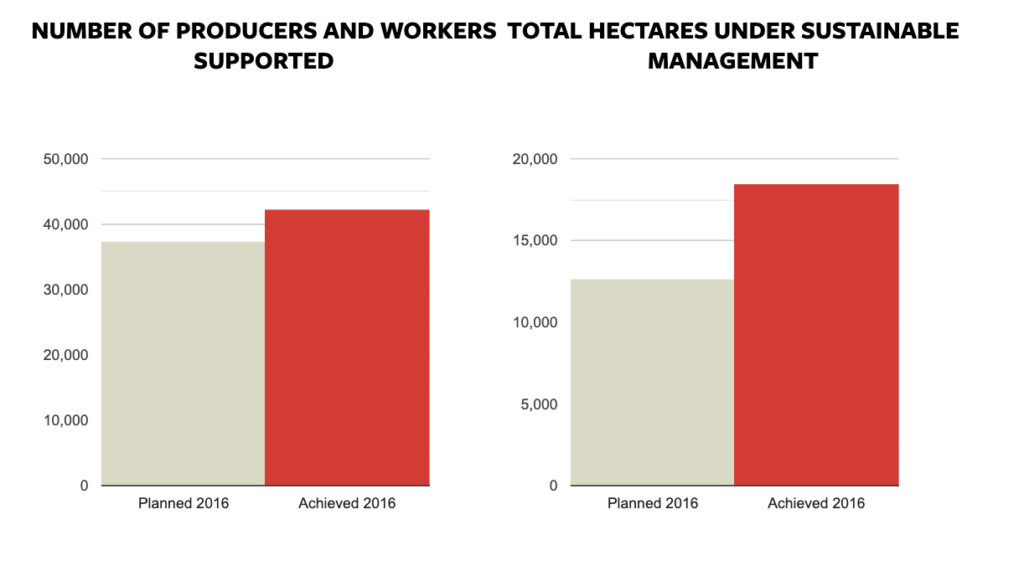
ACHIEVEMENTS
Scientific trials conducted under the Sustainable West African Palm Oil Programme (SWAPP) proved that implementing best management practices (BMP) on smallholder plantations can increase yields from 5 to 18 tonnes of palm oil fruit (FFB) per hectare per year. Investment in mill upgrades with improved, locally manufactured equipment increased oil extraction rates by 67% in 20 artisanal mills.
Having established the business case for investing in smallholder farm rehabilitation, Solidaridad will expand its outreach in Ghana through the establishment of service and input providers for smallholders. Rolling out of this BMP model throughout West Africa could turn the region from a net importer to an exporter of palm oil.
In Indonesia, Solidaridad expanded its field presence in West Kalimantan and launched a landscape programme which is mobilizing a collective commitment from local government, palm oil companies and smallholders to improve productivity on existing land while protecting forests and peatland. In addition, Solidaridad provided quality agricultural inputs and training to 2,400 farmers and prepared 175 smallholders for RSPO certification together with partners Credit Union Keling Kumang and Setara Jambi.
The Solidaridad-led China Working Group on Sustainable Palm Oil facilitated a delegation representing 80% of China’s palm oil imports to Indonesia to learn about best practices in sustainable palm oil production and processing.
REGIONAL COMMODITY PROGRAMMES
Solidaridad launched the Mesoamerican Palm Oil Alliance (MAPA), a regional multi-stakeholder platform working to accelerate the implementation of RSPO best practices and facilitate an effective policy environment in Mexico, Guatemala, Honduras and Nicaragua. In Honduras, Solidaridad continued to lead the Sustainable Honduran Palm Oil Project (PASH), which includes 10 companies representing 80% of Honduran palm oil production, as well as 11,000 families of palm oil producers and workers.

As part of the China Sustainable Palm Oil Working Group, Solidaridad, along with the China Vegetable Oils Associations, co-hosted the Third China Roundtable on Sustainable Palm Oil (RSPO) at the Dutch embassy in Beijing. Over 40 stakeholders attended the event to discuss the crucial steps needed to achieve sustainable palm oil for China, Indonesia and the Netherlands. In November, Solidaridad led a delegation of Chinese palm oil buyers, including COFCO, Sinograin, Wilmar-China, Fangshun and Julong, on a learning visit to Indonesia.

Solidaridad supported setting up the European Sustainable Palm Oil Initiative to strengthen the demand for sustainable palm oil. Solidaridad stressed the importance of more production and purchases of sustainable palm oil at various industry events and contributed to a broad discussion: We need more than traceability and certification to make the palm oil supply chain inclusive. Other instruments and the engagement of governments can help us to have more impact.

Under the Sustainable Trade Platform (STP), an initiative led by Solidaridad in Colombia, producers representing 40% of Colombia’s national palm oil production committed to sustainable production according to the RSPO standard. During the year, 2,575 hectares came under sustainable management and 123,212 tons of palm oil produced by five companies was RSPO certified, of which 23,723 are from a new company certified in 2016.

Through the Asian Sustainable Palm Oil Network, a multi-stakeholder platform, Solidaridad supported alignment of sustainable production, trade and consumption of palm oil in Indonesia, Malaysia, China and India. Solidaridad also supported 12,000 producers in implementing BMPs and 400 workers with better labour conditions in India. In West Kalimantan, Indonesia, Solidaridad worked with Credit Union Keling Kumang to provide 900 farmers with BMP training, 2,000 members with financial literacy training and 2,400 farmers access to good agricultural inputs.

Under its Sustainable West Africa Palm Oil Programme (SWAPP), Solidaridad continued with the upscaling of successful innovations at farm and mill levels. The implementation of BMP led to 24,284 farmers and mill workers improving their incomes and 38,373 hectares becoming more resilient to stress and shocks. With Solidaridad’s support, Norpalm Ghana Ltd. was able to obtain RSPO certification, meaning Ghana now has three RSPO certified palm oil companies.

DEVELOPMENTS
Palm oil production continues to grow at a rate of 7% per year, according to Mielke Oil World 2015. The pressure for a select group of “best in class” producers supplying the European and North American markets to achieve ever higher sustainability standards led to the launch of RSPO Next.
At the same time, numerous reports by civil society accusing large companies of environmental destruction and labour abuses revealed that certification by the Roundtable on Sustainable Palm Oil (RSPO) has not managed to solve many of the major issues confronting the sector. Governments in producer countries are also trying to exercise more control over their palm oil sector by implementing their own sustainability initiatives.
Although bad practices in palm oil production are being cut out of supply chains which reach European markets, more than 85% of palm oil is consumed in the global South. To create change that matters, investment is also needed outside European supply chains. Solidaridad is addressing this challenge in three ways:
- Stimulating industry frontrunners such as Henkel and Chanel to continue buying sustainable palm oil materials while also investing in regions where poverty and environmental issues are worst outside their direct supply chains.
- Supporting sector organizations and national and local governments to drive sustainability at the national level. Solidaridad has supported domestic sustainability initiatives in Honduras, Colombia, Guatemala, Nicaragua, Mexico, Ghana, Ivory Coast, China, India and Malaysia.
- Working with investors, mills and farmers to develop business cases to rehabilitate badly managed palm oil smallholdings. This will reduce the need for grants and in time, enables much larger groups of smallholders to comply with demands for legal and sustainable production.
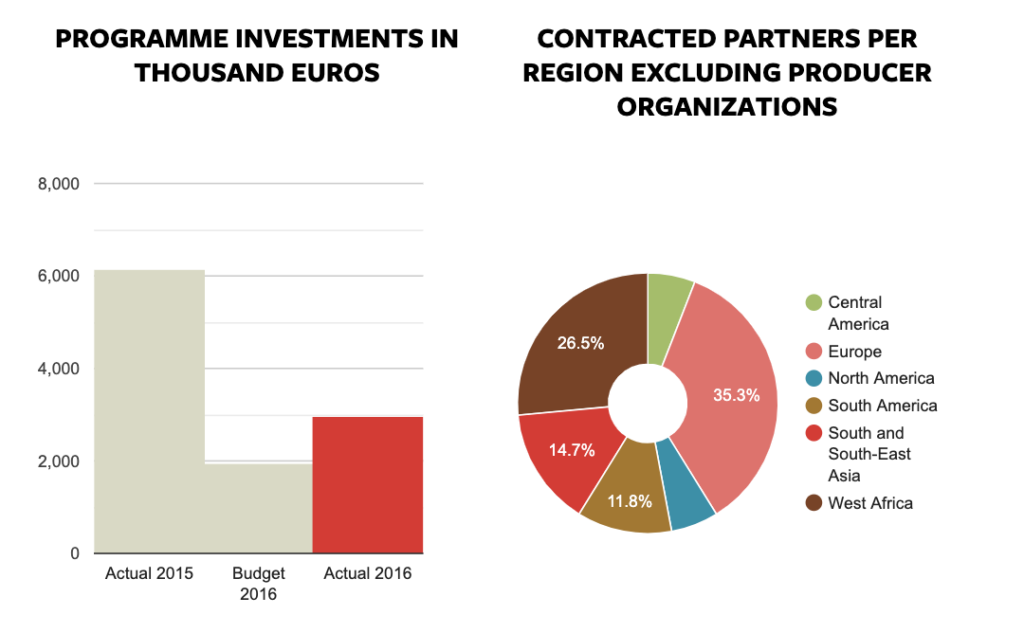
PARTNERSHIPS
In 2016, Solidaridad worked closely with corporate partners such as Henkel, BASF, Chanel, Procter & Gamble and Unilever, as well as dozens of palm oil mills, traders and cooperatives. In many producer countries and the Netherlands, Solidaridad partners with the government and civil society groups such as WWF, SNV and IDH.
Solidaridad also partners with governments and industry to develop and support domestic palm oil standards in Asia. Solidaridad signed Memoranda of Understanding (MoU) with the Solvent Extractors’ Association of India and the Malaysian Palm Oil Board to develop an Indian palm oil sustainability framework and to provide support to Malaysian palm oil companies on sustainability issues, while better including smallholders.
In Latin America, new partnerships were developed under various national sector initiatives. In Mexico, Memoranda of Understanding were signed with important industry partners, associated companies and cooperatives, and agriculture universities as strategic partners. In Nicaragua, a cooperative agreement was signed with CAPROPALMA, the Chamber of Palm Oil Producers and Processors, to build a Sustainable Landscape programme along the South Caribbean Coast, while also implementing best practices with producers to increase their productivity and competitiveness in compliance with the RSPO norm. Solidaridad established a new partnership with an international buyer in Colombia, which will support 251 smallholders towards certification in the coming years.

CHALLENGES
Current market requirements in Europe and North America, with their emphasis on traceability and ever higher standards, risk pushing smallholders out of major brands’ supply chains, as smallholders often cannot comply with such stringent demands.
Furthermore, it may lead to the creation of a two-tier market, where the palm oil supplied to these markets comes from a small number of companies in “risk free” areas, while the majority of production, which supplies emerging markets like India, China and Indonesia, continues as “business as usual” in regions where deforestation and compliance with good labour practices are worst.
To address these challenges, Solidaridad focuses on achieving relevant and measurable improvements on the ground by working with smallholders, plantations and other partners in the supply chain to improve environmental practices, incomes and labour conditions for smallholders and workers. Solidaridad supports smallholders for whom it is most difficult to comply with sustainable practices with metric-based continual improvement systems so that they receive positive incentives for change rather than risk being cut out of supply chains.
Solidaridad works with the RSPO to ensure the adoption of smallholder-inclusive strategies and mechanisms, among others as co-chair of the Smallholder Working Group. Solidaridad also supports governments and national sector associations to invest in national sustainability initiatives, particularly in regions where there is as yet not a business case for companies to invest in adoption of voluntary sustainability standards.
PROVING NEW CONCEPTS FOR COLLABORATION IN SOY
Soy underwent an intense shift in 2016 towards new concepts being deployed at the local level, while also phasing out a more traditional approach that had a strong emphasis on producer support. As a result, Solidaridad is using all its knowledge and experience to create new mechanisms for expanding its collaborations with governments, big soy associations and business platforms to increase the scale of impacts on key issues such as deforestation and agrochemicals.
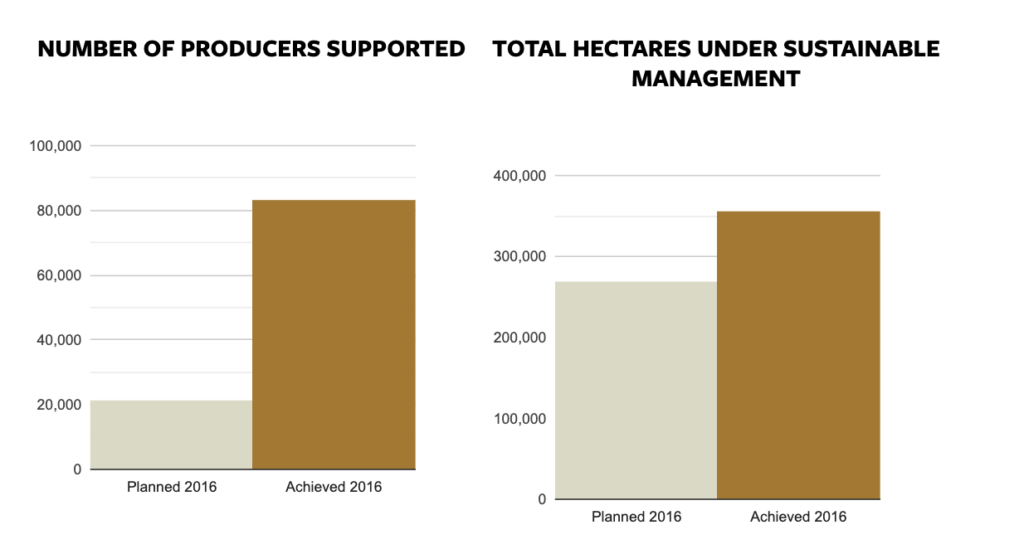
ACHIEVEMENTS
By collaborating with and supporting soy producers and soy producing companies, Solidaridad significantly contributed to increasing the volume of soy with improved sustainability performance that is supplied to the global market. This extends to both certified and non-certified soy, and covers countries in Argentina, Bolivia, Brazil, China, India, Mozambique and Paraguay.
The work done in this approach benefitted producers with improved productivity, efficiency and income, as well as increased risk mitigation. In addition, in-house knowledge is now available on how to organize producer support for sustainable soy production. This knowledge could be used for other commodities if desired.
Solidaridad projects also included testing the first pilots in “Sustainable Landscapes” and “Advocacy for Change” programmes, which represent Solidaridad’s shift towards a new strategic approach. Proofs of concept developed by Solidaridad partners have achieved outstanding results, which include:
- Higher levels of stakeholder engagement, including all relevant landscape stakeholders (producers, local and national governments, processors, traders, etc.)
- Higher levels of territorial governance, with improved territorial management practices
- Increased commercial transactions that include sustainability requirements
Overall, this indicates that Solidaridad adequately addressed the need for the market to identify new tools to embed sustainability, while the market showed there is still interest for the standard and certification business.
REGIONAL COMMODITY PROGRAMMES
The partnership with Marks & Spencer in Paraguay ended in 2016. The only remaining partnership is with Dutch Sustainable Pork Value Chain Association, which supports the Mozambique soy programme. Additionally, Solidaridad cooperated closely with the dairy sector that sources 100% RTRS “book and claim” soy in Netherlands, and through ARLA in Denmark and Sweden.

In the biggest supplying countries of soy in Latin America, a strong focus was put into shifting from direct producer support to landscape and advocacy for change management. Projects showed that given the right incentives, soy producers are willing and able to provide certified soy under the highest requirements, like those in the RTRS Standard. However, what was learned is that the momentum created wasn´t enough to mitigate on-going issues.

In India, soy production is continuing its increasing relevance and share among small-scale producers. Soy is viewed as a quick cash crop. There is also a strong gender component because women are included for manual labour in the fields. With this context in mind, Solidaridad put special focus on increasing financial security for soy by creating direct links with medium and big processors. Projects also focused on empowering women in commercial and financial transactions linked to soy.

Solidaridad identified that one of the major constraints to soy development in Southern Africa is the lack of availability of technology designed to fit the needs and capabilities of small-scale soy producers. Solidaridad worked on sector transformation by combining promotion of good agricultural practices and services provision, and by focusing on mechanization to enable smallholders to increase their production area.

Solidaridad along with the Paulson Institute, TNC and WWF-US jointly launched the Sustainable Soy Trade Platform (SSTP) to facilitate in cross-regional collaboration between the Chinese soy industry and producers in South America to develop joint consensus on responsible production and procurement. In 2016, SSTP facilitated a historic signing of the Memorandum of Understanding between the China Soybean Industry Association and Brazil’s Vegetable Oils Association (ABIOVE) and the Soy Producer Association.

DEVELOPMENTS
Brazil, Argentina and Paraguay remain the top exporting countries while global demand for soy continues and will continue to increase. Currently, China remains as the main importer of soy. In this context, Solidaridad concentrated its efforts on shifting its strategy from a producer support and certification-based approach towards a territorial or landscape management approach in the main exporting regions.
Solidaridad also focused on facilitating the creation of a business platform that increases the availability of information about supply and demand. In this way, Solidaridad expects to increase its influence on strengthening the process of mainstreaming sustainable soy.
A few national governments, such as China and Brazil, have recently demonstrated their determination to collaborate and contribute to transforming their soy supply chains into more sustainable models by helping reduce deforestation or increasing the level of transparency in the supply chain. Solidaridad has tapped into these opportunities by facilitating engagements between different stakeholders to accelerate this process. This will probably be Solidaridad´s overarching strategy for the next four or five years, combining different tools, technologies and stakeholders to create more effective solutions in terms of reduced costs, increased impacts in terms of reducing deforestation and increased traceability and transparency.
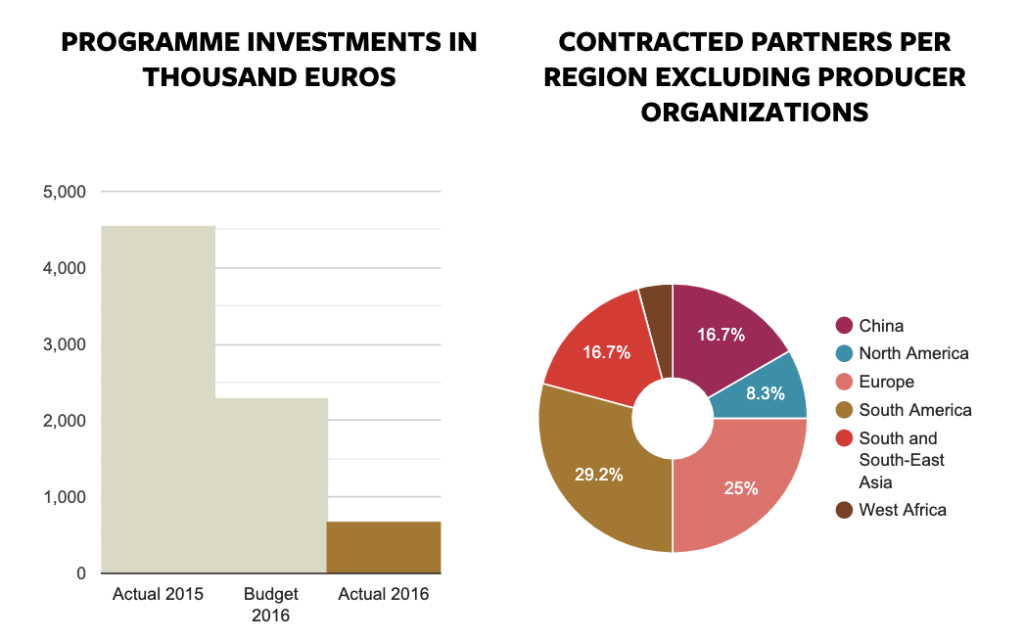
PARTNERSHIPS
In South America (Argentina, Bolivia, Brazil and Paraguay), Solidaridad engaged trading companies including Cargill, Maggi, Nidera / COFCO and ADM. Their support has been important for incentivizing their suppliers to achieve RTRS certification or use any other sustainability standard and incorporate the Rural Horizons system.
In India, partnerships were formed with the Indian Institute of Soybean Research (IISR), a premier Indian government institution for soybean research and development in the country. The partnership is mainly focused on addressing current challenges in sustainable soy production and to promote new technologies based on principles of “more with less”. A partnership is also being formed with the provincial government of central Java to promote self-sufficiency in soy and food crops.
In China, the China Soybean Industry Association continued to be an ongoing strategic partner. The main stakeholders include soy traders Hopefull group, Jiusan Group, Sinograin, and COFCO in working towards achieving responsible procurement.
In Europe, the main engagements included Marks & Spencer, Keten Duurzaam Varkensvlees and ARLA to promote sustainable and certified soy. Solidaridad also worked with NIDERA / COFCO and IDH to search for additional collaborations.
In the central part of Mozambique, Solidaridad worked in partnership with Export Trading Group (ETG) and CLUSA rolling out a climate-smart agriculture project aimed at promoting good agricultural practices and robust infrastructure through block farming in the soya and pigeon pea value chains. Solidaridad also supported access to production inputs including finance with funds from the World Bank.

CHALLENGES
In 2016, Solidaridad had the challenge of redefining its role in the soy value chain. This was mainly due to the fact that many of the previous programmes concluded in that year were especially focused on direct producer support. This required Solidaridad to move away from hard-won relationships built up over the years, especially at the producer level. Solidaridad sought to build and occupy new niches with governmental organizations and other relevant value chain stakeholders.
On a sector level, challenges continue to be related to the expansion of the crop to other regions, inducing land use changes or increasing the risk of soil degradation and other environmental risks. Additionally, the use of pesticides, especially those associated with the technological “package” which allows for the rapid adoption of the crop by farmers, has been growing for several reasons. The reasons may include low awareness, increased weed resistance, and excessive influence from agrochemical companies.
In South America, challenges included an increased level of competition from other NGOs. It has been difficult to get traders, who are key to the value chain, to commit to sustainability.
In India, on a sector level, challenges continue to be related to the profitability of smallholder businesses, availability of supplies, risks of land degradation and climate change.
In China, sustainability has yet to have a clear mandate due to the lack of a successful business case. Solidaridad is building direct links between the Chinese market and stakeholders in South America.
SUSTAINABILITY BEYOND CERTIFICATION
The sustainability narrative for the global sugarcane sector is changing. Water, climate change, labour, productivity, smallholder vulnerability and outgrower integration issues have emerged as major challenges. Solidaridad continued to develop multi-stakeholder dialogues and partnerships to address regional and global priorities. The focus in 2016 was on implementing good agricultural practices, creating robust infrastructure, enabling sustainable landscapes and facilitating better policy environments.
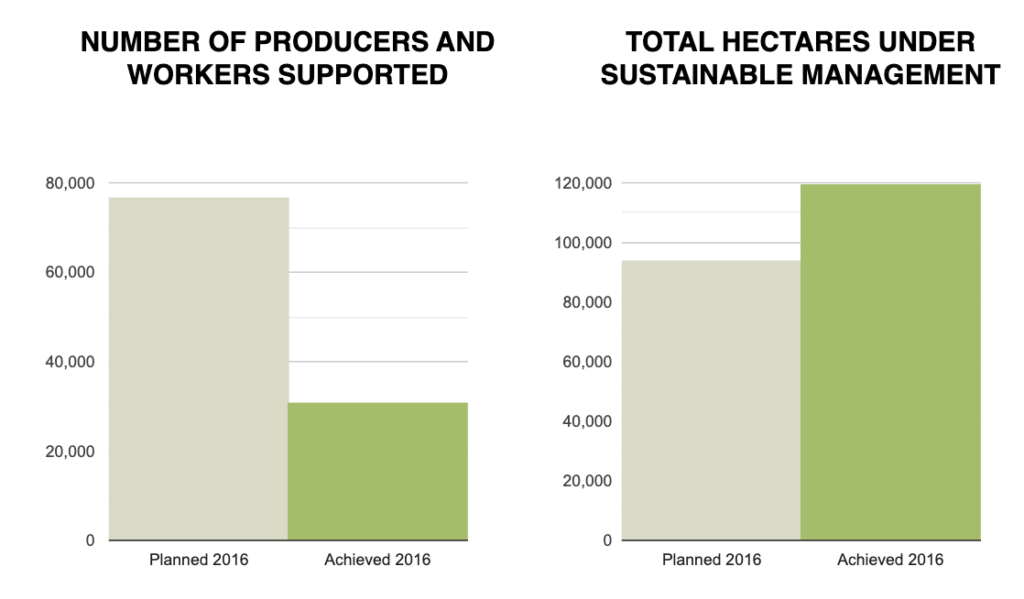
ACHIEVEMENTS
In 2016, Solidaridad sugarcane programmes were recognized as innovative, globally credible and locally relevant. The Brazilian ELO programme, and the Rural Horizon platform and digital tools expanded to Central and South America, reaching 26 mills, 2,200 farmers and 273,000 hectares. Three outgrower farmers from Brazil obtained Bonsucro certification, and 17 farmers were certified by the Roundtable on Sustainable Biomaterials. A national sustainability guide was developed for the Colombian sugarcane sector. The Worker Health and Efficiency Program initiated in Mexico and Central America completed its second research cycle.
In India under the FDW programme, adoption of good agricultural practices enabled alternate income and better water productivity for a large number of farmers. In addition, two more sugar mills from Parry obtained Bonsucro certification, 15,000 farmers were trained in financial literacy and 100 farmers on rural entrepreneurship as an outcome of the FSP project.
Bulk water infrastructure improvements in South Africa resulted in better water availability and increased sugarcane yields. In Malawi, good agricultural practices, women’s action groups and diversified training improved transparency and better income streams at the village level. The Kilombero basin project in Tanzania enabled 8,000 smallholders representing 18 outreach farmer associations to manage and improve the productivity of their land in a sustainable manner.
REGIONAL COMMODITY PROGRAMMES
Under the PanAmericaña programme, Solidaridad co-convened the Mexico Working Summit in partnership with Bonsucro and CNIAA (Mexican National Chamber for Sugar and Alcohol Industries). The event generated intense interest in collaboration and participation among key stakeholders. The platform continued to gain traction throughout the year, with interest in expanding the platform to Guatemala, El Salvador, Honduras, Nicaragua, Haiti and Dominican Republic.

The sugarcane programme funded by DGIS was implemented in Tanzania in the Kilombero basin for the past three years. The programme covered capacity building for 8,000 farmers in 18 outgrower associations. The block farming pilot on 100 hectares received overwhelming support from both farming community and partners. The model is focused on reducing land fragmentation, increasing mechanization potential and improving productivity.

In Europe, Solidaridad raised awareness about social and environmental challenges in the sugarcane sector in India and Central America. The impact of chronic kidney disease in Central America increasingly garners the attention of a broad public. Hopefully, small steps towards sustainable production can lead to substantial health gains for sugarcane workers.

By consolidating partnerships with mills and farm associations, Solidaridad is recognized as a respected NGO working in the sugarcane sector in this region.The continual improvement projects designed in partnership with stakeholders have been disseminated far and wide and are starting to deliver results in the field. The programme also expanded to Colombia and now supports 28 mills, two farmer associations (Socicana & Procana) and 2,200 farmers in this region.

Solidaridad continued to implement the water efficiency programme in the sugarcane sector in India. Coca-Cola and IFC supported the programme in Uttar Pradesh which focuses on good agricultural practices, water efficiency, integrated communication technology, agri-tech services and capacity building. To understand and scientifically manage water efficiency, four integrated water trials were organized in various agro-climatic zones. The results indicate that multiple possibilities for reducing water use and improving water efficiency do exist.

The investments made in bulk water infrastructure through the FDW project in partnership with TSGro, the Water Research Commission and Akwandze started to yield positive benefits for the smallholder sugarcane outgrowers in Nkomazi, South Africa. In Malawi, smallholder sugarcane outgrowers continued to receive training in good agricultural practices, adult literacy, leadership training, sweet potato production, and village savings and loans, in partnership with Concern Universal.

DEVELOPMENTS
The sugar Industry is faced with an unprecedented and seventh consecutive year of global surplus. Depressed prices in domestic and international markets made the industry struggle for its survival. Lower crude oil prices curtailed further momentum for the production of fuel ethanol.
Most of the mills tried to refocus their sustainability strategies on resilience and to meet local pressing priorities. At the same time, multinational corporations continued to express their sustainability commitments. Their brands came increasingly under public scrutiny because of regional supply chain sustainability issues. The focus shifted to locally relevant solutions to ensure regional issues of supply chain sustainability are addressed.
There has also been widespread debates on overconsumption of sugar and its negative health effects. Various governments are considering introducing policies to reduce dietary intake of sugar.
Mobile technologies and social media also had an impact. They unleashed real-time insights from farmers and consumers, driving innovations and enabling better productivity throughout the value chain.
In 2016, Solidaridad readjusted and re-aligned its strategies, dialogues, partnerships, process and plans to meet new realities. Innovative tools, good agricultural practices and digital technologies to address locally relevant sustainable issues were developed. New avenues of funding were explored.
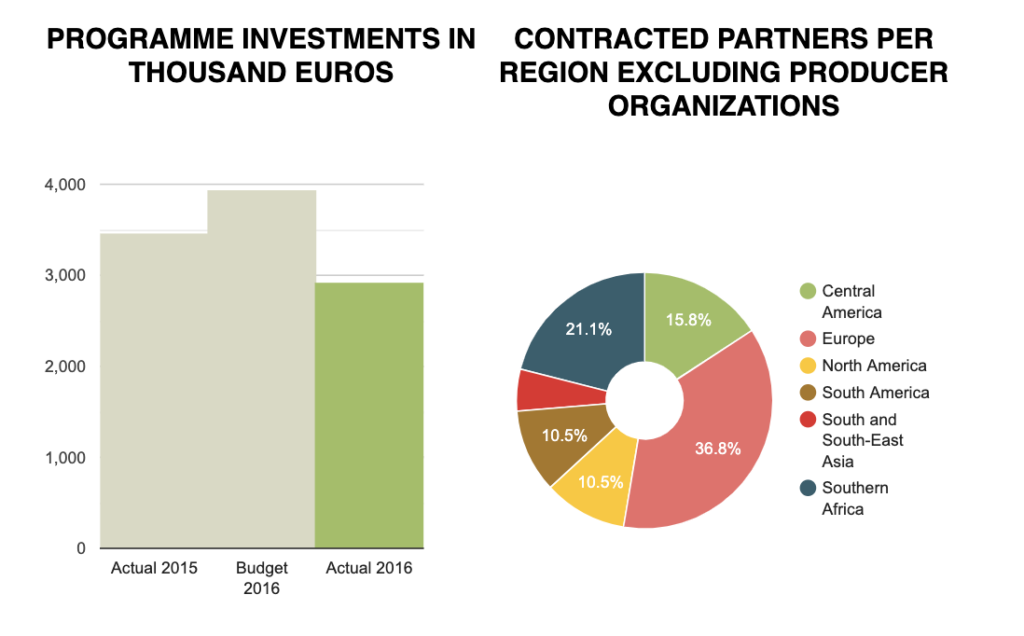
PARTNERSHIPS
Solidaridad diversified the scope, breadth and structure of programmes enabling multi-stakeholder participation at all levels of project intervention. Regional platforms emerged to solve locally relevant issues of sustainability on a priority basis.
In Brazil, the ELO programme initiated with Raizen expanded to include Socicana – one of the largest farmer associations. A new partnership was developed with Orplana – an umbrella farmer association – to address issues of sustainability in the southern Brazilian region. A national sustainability programme was started with Colombian sugarcane sector (Procaña – producer organization, two mills, the Ministry of Agriculture and Cenicaña – a national research centre).
PanAmericaña, a regional sugarcane sustainability platform, was also introduced to Mexico and Central America in 2016.
In South Africa and Malawi, existing water projects with multiple partners continue to focus on efficient water use and productivity of sugarcane. With the support of the Dutch Ministry of Foreign Affairs and the European Union, a farmer support programme began in Tanzania in conjunction with the Tanzania Sugar Board, Kilombero Sugar Company and Kilombero Community Charitable Trust.
Water continues to be the critical issue of sustainable sugarcane production in India. A landscape programme on water and good agricultural practices was commenced in the Ganga River Basin in partnership with Coca-Cola, IFC and DCM Sriram. The programme covers four factories representing 48,000 farmers.

CHALLENGES
Global sugarcane production seemed to be fairly balanced regardless of the decline in production in India and Thailand. Sugar prices may strengthen in the near future because of low levels of stocks. The end of ACP sugar quota regimes in October 2017 by the EU will reduce imports and erode price preference. This will have a profound impact on the world sugar price and market dynamics. Companies with high costs in production will be most affected. The focus will shift to regional markets and cheaper production to mitigate risk.
Climate change forecasts suggest that weather events are likely to be more severe than in the past, putting industries at greater risk. Issues of water, crop loss, diversification, technology, labour, capacity building, health and livelihoods will dominate the sugarcane landscape.
Digital technology and innovations increasingly enable smallholder farmers to connect and powerfully transform their own lives. More and more companies will recognize that engaging smallholder farmers more closely is a sound, sustainable strategy. Increasing pressure from consumers and the general public on brands to deliver on their sustainability promises could result in a new chain of partnerships.
With its ability to build multiple stakeholder partnerships and vast experience of intervening in value chains using multiple expert perspectives, Solidaridad is well positioned to leverage technology, scaling them up to bring greater resilience and address sustainability challenges in the sugarcane sector.
THE MOST USED BEVERAGE IN THE WORLD
Tea is amongst the most competitive products in the beverage industry. The competition is high and the sector needs to be seriously concerned about developing an innovative strategy for its product, process and markets. It also needs to be fully aligned with the global sustainability agenda. The sector, when viewed in regional contexts, is generally considered to be mature and too slow to adapt to change in both behavioral and in its adaptation of current technology. Despite that, it continues to remain the second cheapest beverage after water.
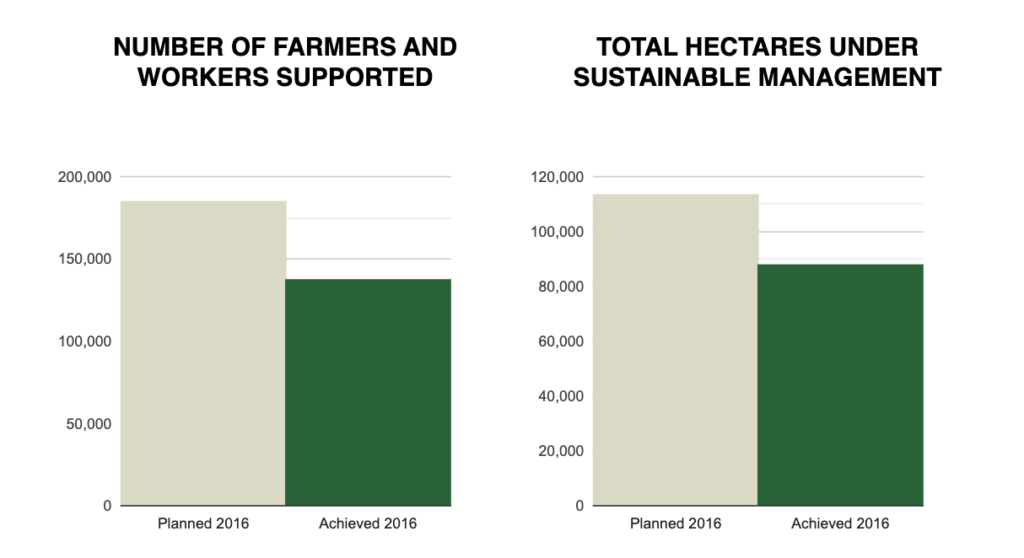
ACHIEVEMENTS
As the lead implementing partner for the Trustea India Sustainable Tea programme, the largest of such in the world, Solidaridad’s participation was key to achieving a verified volume of 371 million kilograms of Trustea verified tea for the domestic market. This achievement was possible because of the outreach model adopted and the close interaction the farm support centres maintained with the producer companies. The programme focused on:
- Training auditors to ensure the quality of audits
- Introducing systems assurance audits (control audits) on a random basis to ensure quality is not diluted at any stage
- Including small tea growers in the project – more than 25,000 small farmers were verified
- Developing a product traceability mechanism (chain of custody) for a continuous audit trail from tea bust to factory exit gate
- Close cooperating with the local authority, Tea Board of India
Solidaridad built on its regional alliance by creating the “Asia Consensus” in which the global Solidaridad Network played a crucial role in bringing together the China Tea Marketing Association and the India producer association in southern India (UPASI) to the table to sign an MoU. This was a groundbreaking achievement.
In East Africa, two projects were brought over from the previous year: climate change adaptation and mitigation and that of direct tea exports to the European Union. Furthermore, a project on enabling policy environments under the Advocacy for Change programme was started in Uganda. During the year, a baseline was established, and a validation workshop was provided to stakeholders, during which a steering committee was formed to drive the implementation of the project. A partner enhancement assessment was also started.
REGIONAL COMMODITY PROGRAMMES
Engagement with the China Tea Marketing Association continued with a view to strengthening relationships and cooperation and bringing about synergies in the region. Solidaridad will assist in the development of a tea sustainability code or standard for China.

Solidaridad’s work on climate-smart agriculture continued on building the capacity of farmers and staff of three factories, as well as training 82 promoter farmers and 136 agronomists who in turn reached 1,000 farmers. A massive tree planting programme (83,000 indigenous tree seedlings) was undertaken to improve biodiversity in the catchment areas of the factories. A total of 30 agronomists from smallholder and tea estate factories in Uganda were trained on tea husbandry, covering both theory and field practices.

Solidaridad Europe collaborated with the DE foundation and Utz Certified to evaluate a tea programme in Sri Lanka. It also supported the development of a new proposal and project for the European Union for the tea programme in Sri Lanka. Solidaridad also continued to spur the global debate on living wages by contributing its experiences from the tea sector.

Development of a sustainable supply chain for yerba mate started in 2015 and continues to promote the adoption of good agricultural practices for the production of yerba mate. Yerba mate producer support is key to the programme and is achieved through trainings and technical advice to cooperatives. As part of the social scope, Solidaridad also supported small producers to improve their livelihood who were not associated with the cooperative.

Trustea, the India sustainable tea programme, completed its third successful year with significant milestones being achieved. The Trustea programme emerged as the largest tea code for sustainability by transforming 36% of India’s tea production.

DEVELOPMENTS
The tea growing regions experienced a wide range of developments in 2016. The year saw a turning point as China began to play a more active role on the global stage as it started to exert its influence in the global arena, not only on economic matters but also on sustainable development. As a first step, China demonstrated its potential leadership in the climate change narrative when President Xi Jinping submitted its ratified Paris Agreement to the UN Secretary-General at the G20 Summit in September. China’s image as the world’s “factory” is being transformed to one of an innovator in science and technology.
Producing more food with fewer resources to meet ever-rising demands has emerged as a major challenge for Asia. This has resulted in pressures on land, water and energy resources on account of competing claims. Farm sizes are also becoming smaller and the availability of farmland scarce. The Indian government has committed to a goal of doubling farm income in five years. The sustainability discourse in India (as in much of Asia) is driven through locally developed and owned standards. The Indian government actively supports the Trustea standard for tea.
In Argentina and Brazil, the region’s economy shrunk in 2016. Heightened volatility in currency markets and severe recessions resulted in reduced investments.
In East Africa, the tea producing countries reported increased production resulting in lower price realizations for smallholder farmers, which led to reduced incomes. Climate change continues to be a major threat to the tea industry in the region.
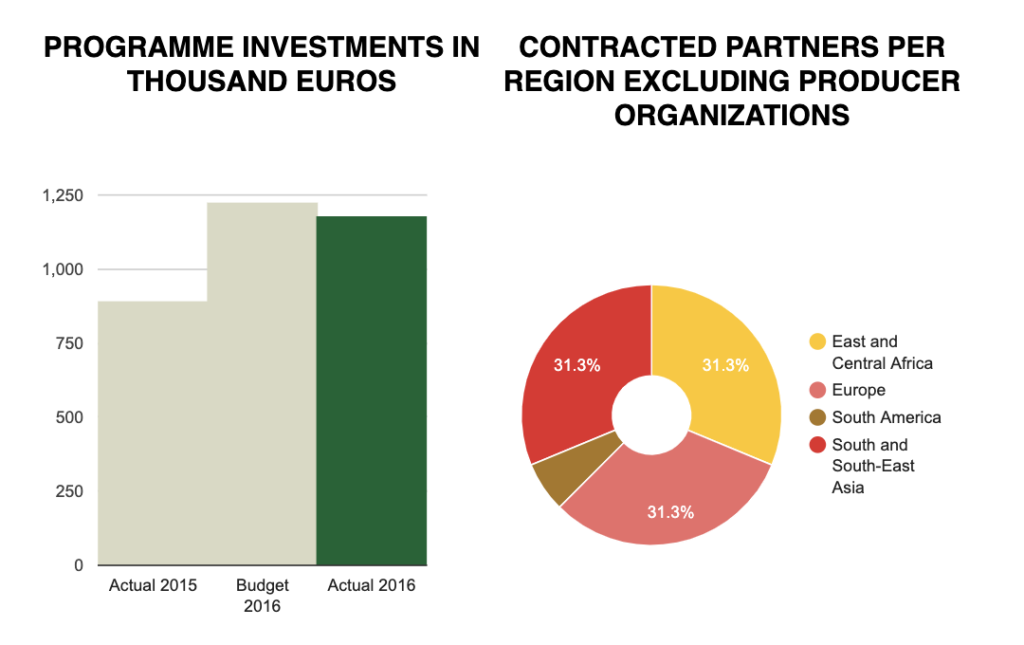
PARTNERSHIPS
Through the Trustea programme in India, partnerships with major businesses such as Hindustan Unilever Limited and Tata Global Beverages Limited progressed well. The Trustea programme seeks to engage with other regional tea packers and is hopeful of bringing them on board as partners to the programme.
Solidaridad also maintains long-standing partnerships with numerous government-affiliated industry associations like the China Tea Marketing Association.
In East Africa, Solidaridad’s tea programmes focused on climate change partnered with the Ethical Tea Partnership, Tea Directorate, Kenya Agriculture and Livestock Research Organisation (KARLO), Tea Research Institute, the Kenyan Tea Development Agency (KTDA) and the East Africa Tea Trade Association (EATTA). In Uganda, partnerships were maintained with the national research organization and Uganda Tea Association.

CHALLENGES
The farming environment has become unforgiving and punishing which compels growers to modify management practices to sustain production.
In the last 30 years, more extreme weather events have been witnessed as compared to the early and mid-twentieth century, while the last decade has been reported as one of the harshest for extreme weather events. Tea has been able to resist damage mainly because of scientific inputs and appropriate decision-making processes adopted at the field level.
Climate-smart agriculture consisting of seedlings and vegetatively propagated tea cultivars have been developed which suit local conditions and cultural practices. A single approach for identification and recommendation of tea cultivation practices is not a practical and acceptable one. That’s why it is essential to develop national or regional adaptation measures for combating risks of climate change while sharing knowledge among tea growing nations.
The second most important challenge is determining what is the right price for tea. This is a question raised in every tea growing region and needs to be addressed appropriately through a platform or roundtable stakeholders in the supply chain.
CASTING THE DYE FOR SUSTAINABLE TRANSFORMATION
As in previous years, China and Bangladesh remain the top textile producing countries. Solidaridad continued activities in these countries by bringing best practices to scale and contributing to solutions for complex issues such as cleaner production, audit duplication and fair wages. With more brands looking out for new sourcing destinations, Solidaridad scaled up its contributions to a sustainable textile sector in countries like Ethiopia and Myanmar as well.
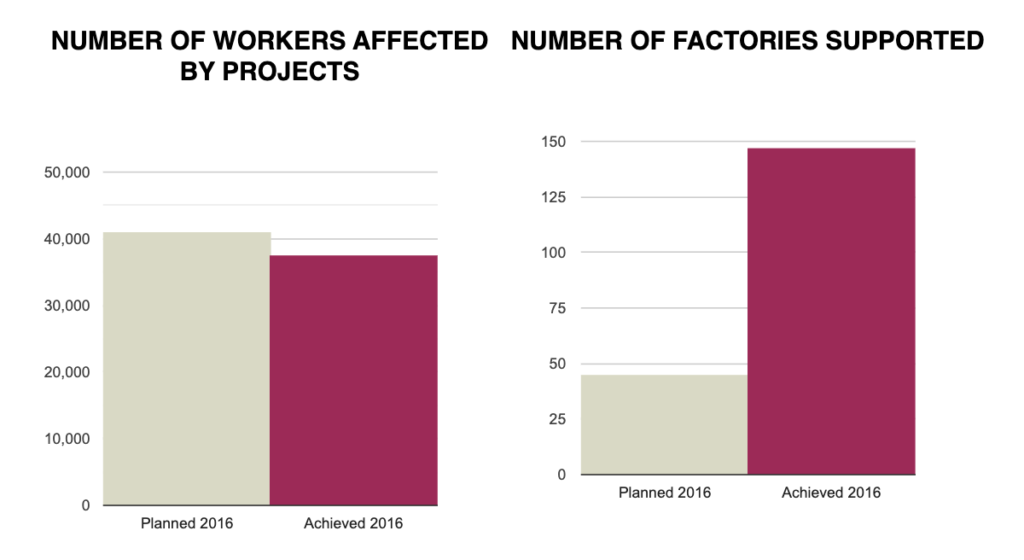
ACHIEVEMENTS
Brands and retailers are key players in the textile value chain that drive sector transformation through more sustainable buying practices. As part of the Bangladesh PaCT Programme in 2016, Solidaridad trained employees at the head offices of PaCT partner brands. In these follow-up workshops that started in 2015, buyers and designers gained a better understanding of the environmental impact of design and sourcing decisions.
Solidaridad continued working on the pilot project for fair wages, together with the Fair Wage Network, two brands and a few suppliers in China. In addition to direct dialogue and work with suppliers to improve wages in China, an extensive assessment of the partner brands’ buying practices is also part of this work.
Solidaridad strengthened engagement with the Dutch market and contributed to the establishment of the sustainable clothing and textile agreement for the Dutch textile sector which was ratified on 4 July 2016. As part of the steering committee, Solidaridad will play an active role in the implementation of the agreement.
Solidaridad’s work in China and Bangladesh focused on promoting broader adoption of sustainable production techniques at the supplier level. The Better Mill Initiative (BMI) in China achieved significant impacts. A total of 43 mills invested in improvements over a period of 15 months which resulted in savings of 6,600,000 tons water, 15,200,000 kWh of electricity, 144,000 tons of CO2 emissions and 72 million RMB in costs. PaCT in Bangladesh, implemented by International Finance Corporation (IFC) in partnership with Solidaridad, provided similarly impressive results.
REGIONAL COMMODITY PROGRAMMES
As the Chinese government is setting stricter regulations on emission (including wastewater discharge, air emission and sound hazardous waste management), and with increasingly surging production costs in the textiles industry, factories are seeking support from Solidaridad’s Better Mill Initiative.

Solidaridad’s interventions for textile in this region have concentrated in Ethiopia, which is one of the fastest emerging economies in Africa and is evolving as a potential textile and apparel sourcing destination. Solidaridad is confident that growth of this industry has the potential to contribute to poverty alleviation, create jobs under good working conditions and provide livelihood opportunities for hundreds of thousands of people in the coming decade, particularly women.

Solidaridad continued working to achieve sector level transformation by engaging more brands with sustainability and getting them to think about how they can be part of the solution through their design and purchasing practices. Sustainability in the supply chain is possible, but it needs scalability and engagement of the whole supply chain.

Solidaridad furthered its mission to bring established best practices to scale, with a particular focus on promoting the uptake of sustainable design, development and procurement practices at the brand level. At the same time, the organization also built on early initiatives in emerging textile-producing nations, where Solidaridad is playing a key role in ensuring that best practices and experiences from established industries can steer a path to sustainable growth.

DEVELOPMENTS
The increasing demand for garments worldwide is leading brands to search for new sourcing destinations. In the last few years, Solidaridad has seen this labour-intensive sector become established in countries where there is sufficient availability of cheap labour. This encourages a “race to the bottom” which Solidaridad is trying to prevent.
With experience from the past 16 years, Solidaridad knows that a sustainable industry can also be a competitive one, which also allows for the sustainable economic growth of the least developed countries. In its role as transition manager at this early stage, Solidaridad started to bring key stakeholders together in Ethiopia and Myanmar including brands and retailers, producers, governments, knowledge institutes, the financial sector and civil society organizations to ensure sustainability is part of the sector’s growth strategy.
Production countries such as China and Bangladesh continue to be key in achieving a sustainable transformation of the global textile industry. The Partnership for Cleaner Textiles (PaCT), the Fair Wage pilot and Better Mill Initiative (BMI) are clear examples of Solidaridad’s work in promoting a broad adoption of sustainable production techniques and working conditions at the supplier level. The programmes – both in their third year of implementation – reached around 180 suppliers.
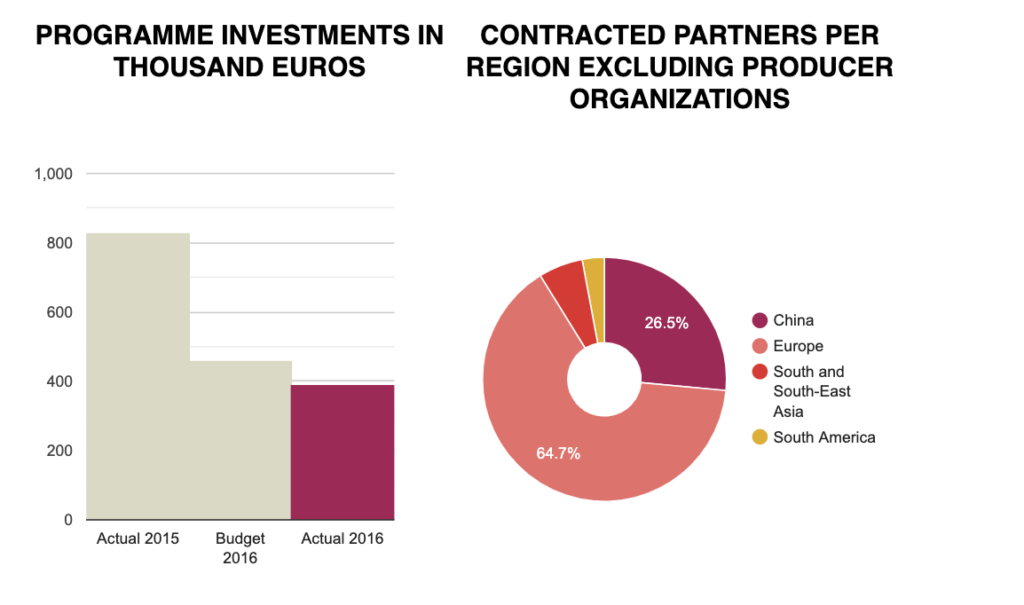
PARTNERSHIPS
The key players in the textiles value chain remain brands and retailers, through which Solidaridad influences mills, factories and producers. In 2016, a total of 11 brands, including H&M, G-star, C&A, Lindex and Primark, worked with Solidaridad in an effort to increase textile value chain sustainability.
Since 2014, Solidaridad has had a strategic partnership with H&M. Besides supply chain improvement work, essential elements of this partnership include close communication and being a critical partner. A lot has been achieved through this partnership, yet there is still much to improve. Solidaridad needs to keep challenging stakeholders to take fashion sustainability to the next level.
In addition to brands, Solidaridad actively engages with multi-stakeholder initiatives including the Sustainable Apparel Coalition (SAC). Solidaridad supports SAC’s objective to move away from certification toward continual improvement of textile and apparel production through measuring and communicating impact and is part of the steering committee of the Social and Labor Convergence project supported by the SAC.
Organizations such as the International Finance Corporation (IFC), ASN Bank and the Dutch government continue to be key partners for Solidaridad. Together with ASN Bank, Solidaridad launched the second successful textile campaign in 2016. The Dutch government continues to support and enable Solidaridad’s work in India, Bangladesh, Myanmar, Ethiopia and the Netherlands.

CHALLENGES
Solidaridad believes a comprehensive approach to textile supply chain sustainability will continue to change the industry. Programmes already have the support of multiple stakeholders including major brands, producers and governments. However, Solidaridad needs to engage with more and new stakeholders and align efforts to achieve true sector transformation. Developing programmes from the pilot to mainstream phase requires innovative strategies that will drive large-scale adoption by mills and factories across key sourcing regions. This will be a priority for Solidaridad’s textile programme in the years ahead.
ORGANIZATION
STAFF & DEVELOPMENTS
Solidaridad is an international network organization with partners all over the world. There is one agenda and one strategy: together we learn and progress, together we achieve results and together we decide on future steps.
During 2016, the organization consisted of nine regional expertise centres (RECs) throughout the world with a Network Secretariat connecting the RECs. The Network Secretariat (officially Solidaridad Network Foundation, founded in 2011) is located in Utrecht, the Netherlands, in the same office building as Solidaridad Europe, one of the regional expertise centres. The Network Secretariat is the seat of the Executive Director (Nico Roozen) with a small staff surrounding him and delivering the following tasks that support the whole network:
- Providing services for the development and enforcement of quality assurance systems and standards for financial management, accountability and control, planning, monitoring and evaluation, ICT infrastructure and human resource management.
- Managing global communication, including the Solidaridad international website and the development of tools for global branding and communication.
- Facilitating the process of global policy development by supporting our global organizational entities such as the Executive Director, the Executive Board of Directors, the Global Commodity Teams and the Global Account Teams.
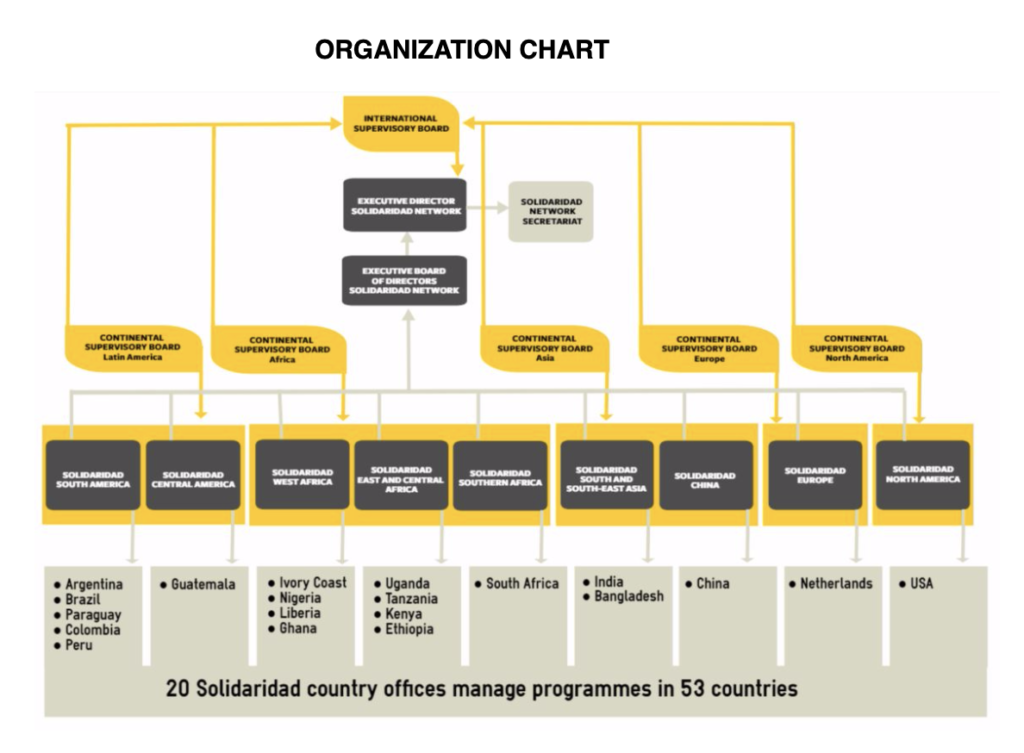
All managing directors must adhere to agreed policies and stimulate optimal cooperation, open communication and knowledge exchange between the RECs. Furthermore, they are responsible for fostering a “giving factor” between RECs, making fair deals on payment for joint and mutual services, and joining forces in order to be stronger together.
LEGAL STRUCTURE
In order to ensure effective daily operations and an efficient payment structure, the nine regional expertise centres in 2016 were grouped on five continents, each with their own supervisory structure. Legal entities for these five continental Solidaridad regions are established in Utrecht, the Netherlands (for Europe), San Francisco, USA (for North America), Panama City, Panama (for Latin America), Nairobi, Kenya (for Africa) and Hong Kong, China (for Asia).
STAFF PER REGION
The total number of employees that were employed throughout the Network as of 31 December 2016 was 491 (2015: 391 employees). The 491 employees corresponded to 454.1 FTE per end 2016.
GENDER DIVERSITY
Solidaridad firmly reinforces equity and diversity principles and practices applied across the employment lifecycle to support and improve gender equality outcomes in the workplace.
SUPERVISION & MANAGEMENT
Solidaridad’s governance structure is based on the continental European governance model. This means, amongst others, a board with a two-tier structure, emphasis on dialogue with stakeholders and focus on achieving consensus. This governance model follows the subsidiarity principle. It aims to ensure that decisions are made as closely as possible to the deepest levels in the organization and that constant checks are made to verify that actions across Solidaridad Network are justified in light of the possibilities available at continental, national or REC level.
Within Solidaridad, the International Supervisory Board (ISB) is at the highest level of international oversight. The ISB monitors policies, the quality of programmes, financial control and the performance of the Executive Board of Directors (EBoD). Direct supervision of the RECs is organized by continent. Each Continental Supervisory Board (CSB) is represented in the ISB by its chairman, thus enabling the ISB to focus on the interest of Solidaridad Network as a whole, instead of focusing on individual RECs. The members of the ISB are:
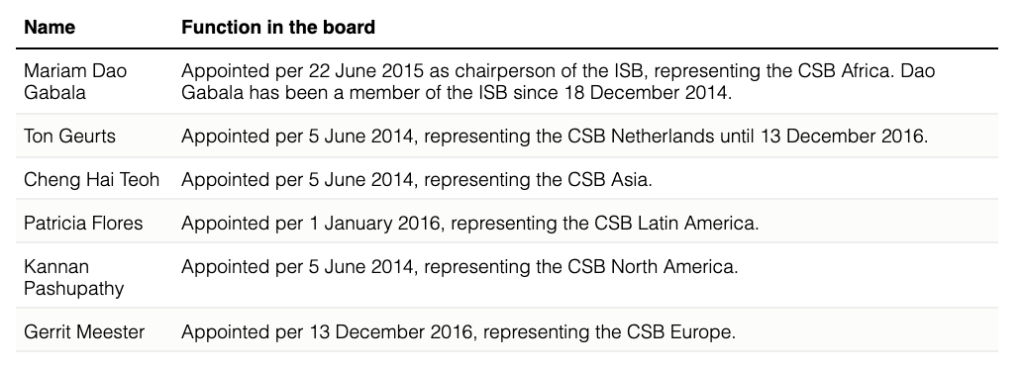
The ISB met twice in 2016, in June and December, both times in Amsterdam.
The Continental Supervisory Boards are entering the mature stage of taking up their role. The boards strive for an optimal composition of five members, respecting a balanced composition in terms of gender, regional representation and areas of expertise and knowledge
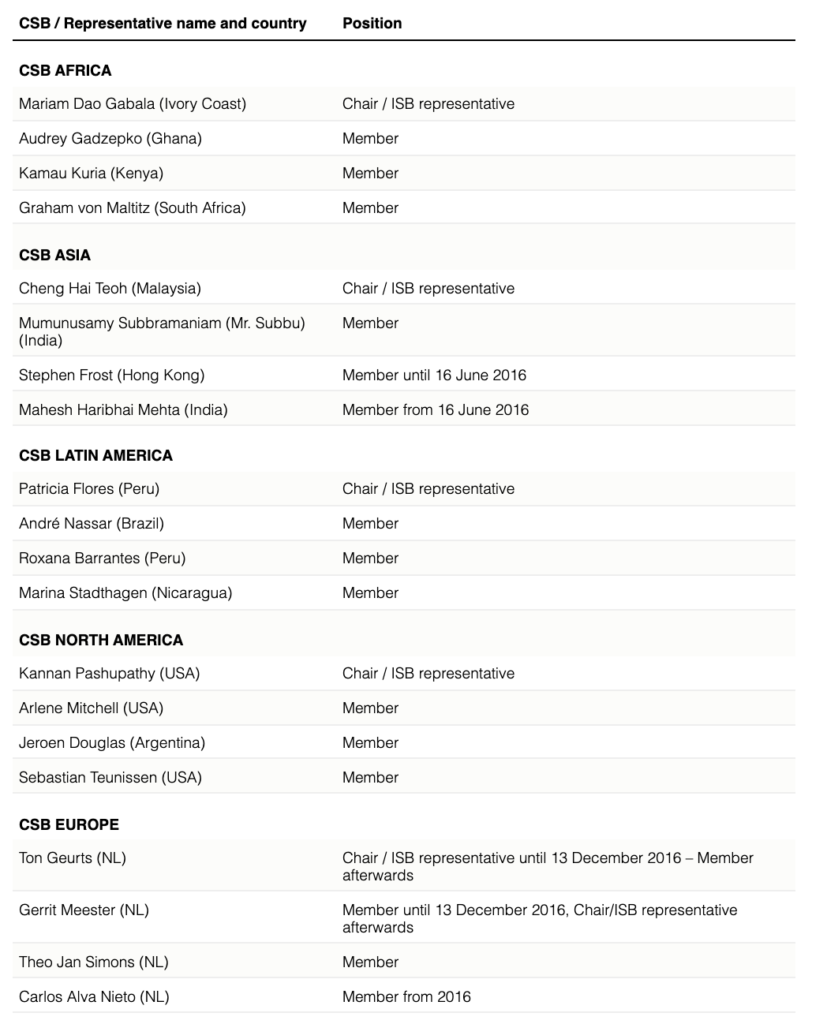
REMUNERATION
The Solidaridad Network Foundation and Solidaridad Europe adhere to the Dutch Wijffels Code and the VFI’s Guidelines for the Remuneration of Directors in Philanthropic Organizations (Adviesregeling Beloning Directeuren van Goede Doelen). The latter proposes a framework for annual incomes of management positions in philanthropic organizations.
Furthermore, remuneration of all employees of the Solidaridad Network Foundation and Solidaridad Europe, plus all managing directors of the Solidaridad Network, is based on the so-called “BBRA scales”, the salary scaling system that is used for civil servants working for the Dutch central government. The job description of a managing director places the function in BBRA scale 14 to 16, depending on seniority and experience.
In accordance with Solidaridad’s statutes, neither the members of the International Supervisory Board nor the Continental Supervisory Boards of Solidaridad receive remuneration of any kind.
ANNUAL ACCOUNTS
The Solidaridad Network implementation budget showed growth in 2016 after a relatively stable period in 2014 and 2015. The Solidaridad budget continues to grow year on year, which is an indication that the level of support from external donors and partners is also increasing.Our results have only materialized thanks to the generous support from many companies, donors and governments all over the world. Our operational budget reached a record €66,2 million, a growth of 19% in relation to 2018. In one decade of Network existence, the organization grew from a bare 18 million turnover, to where we are now.
As in previous years, Solidaridad Europe held the largest share of contracted income, but financial contributions from other regional expertise centres (REC) are growing each year. These indicators confirm the effectiveness of Solidaridad’s innovative model of continental contracting, supported by a continental governance system.
AGGREGATED BUDGET
The total amount that Solidaridad Network invested in 2016 was €43.4 million, slightly below the budget for the year which was set at €45 million.
In alignment with the governance structure of Solidaridad Network, consolidated financial statements are not prepared. The audited financial statements of each regional expertise centre can be found on the respective annual report pages for those centres.
Annual Financial Statement 2016 – Solidaridad Network Foundation (PDF)
The figures below present the aggregated income figures of all entities within Solidaridad Network. Aggregated means that income sent and received from regional centres has been removed. These figures provide an overview of the total budget of all Solidaridad entities together.
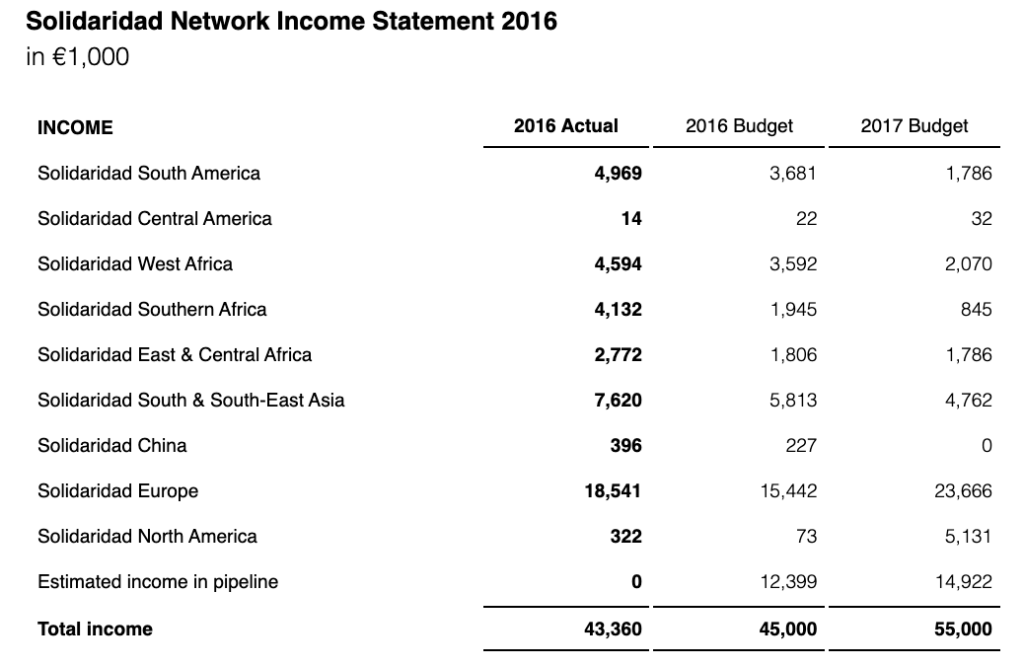
Solidaridad budgets only contracted income and reports on income that has been utilized as actual.
SYSTEM DEVELOPMENTS
Solidaridad aims to achieve a high quality on all fronts, which is particularly important in the area of financial management and control. Since the start of the creation of a worldwide network, the team of Financial Controllers has been working on alignment of the global internal control system. Each REC delivers annual financial statements that are audited by external auditors. Furthermore, 4 RECs (Solidaridad Europe, Solidaridad West Africa, Solidaridad East Africa and Solidaridad South & South East Asia) are certified under the ISO 9001:2008 norm.
NETWORK ACCOUNTING METHODS
All RECs are continually striving towards enforcement and global alignment of Solidaridad systems and standards for financial management and control. The Solidaridad Network works in a cloud-based system that provides support in the following areas in an integrated manner: account management, fund management, financial management and planning, and monitoring and evaluation (PME) of projects.
In 2016, further steps were taken to harmonize the accounting standards of the nine regional expertise centres so they can report their annual figures to the Solidaridad Network Secretariat on the same accounting basis. Preparations were also made to work in one global accounting system as of January 2018. This global accounting system will be integrated with Solidaridad’s project and fund management system.
QUALITY STANDARDS
Solidaridad Europe, the largest regional expertise centre of the Solidaridad Network, is entitled to use the quality mark of the Central Bureau on Fundraising (CBF) and complies with its requirements. The CBF monitors all philanthropic bodies in the Netherlands and evaluates their management and policy in order to increase the transparency of the charity sector.
The Dutch Association of Fundraising Organizations (VFI) is the umbrella organization for philanthropic organizations that raise funds across the Netherlands. Its goal is to increase public confidence in fundraising institutions. The Solidaridad Network Foundation and Solidaridad Europe uphold the principles of the VFI in relation to respect, reliability, openness and quality. These standards are promoted throughout the network. In accordance with the policy of the Solidaridad Network Foundation, other RECs also respect the principles of the VFI.
